#anyway i struggled to come up with visual that fits to draw in the middle so any suggestions is appreciated
Text
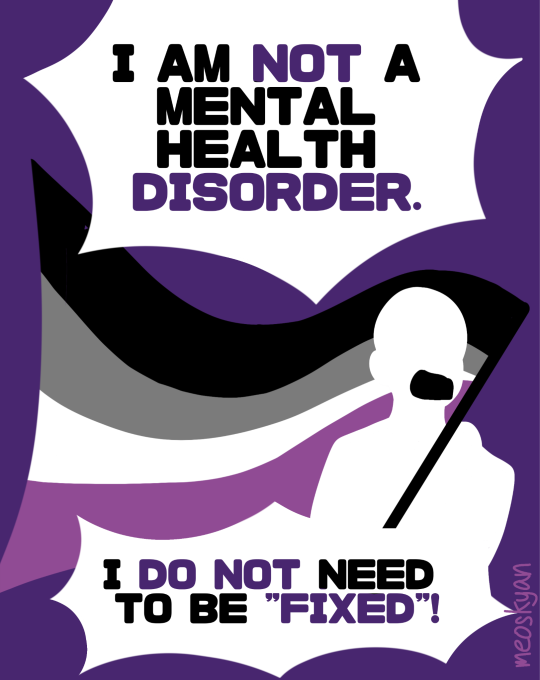
acephobia is so stupid to the point it's comical
#anyway i struggled to come up with visual that fits to draw in the middle so any suggestions is appreciated#maybe ill add some shadows later#art#digital art#drawing#doodle#poster#poster attempt#asexual#ace#asexuality#acephobia#i was looking at articles about ace report stuff and my surprise at seeing so much acephobia led to me making this#some of the acephobic crap people say about aces is so dumb like what u u actually believe that
5K notes
·
View notes
Text
Joining Mesh Edges - Pt. 1
...or something? I've been struggling with what to call this tutorial. "How To Make The Visible Body Parts Line Up With The Clothes So They Don't Clip Or Gap" would be way too long.
I've been meaning to do a tutorial on this for ages, but when I saw @kayleigh-83's frustration in this post, I offered to help. I wanted to have this tutorial up a few days ago, but wound up "needing" to do this other one first. Finding a simple shirt or dress with a lower neckline that wasn't painted on and hadn't already been converted was basically impossible.
The previous tutorial was kind of an "in case this comes up" situation. This one is more of a "best practices" level. You don't _have to_ do this, but it will give better results than leaving a big piece of the body floating around under the clothes. I learned how to do this by looking at meshes by @deedee-sims and seeing how her meshes fitted the body neatly to the clothes. I'm not sure if this is exactly how she does it, but it's what I figured out to get a similar result.
To put it in visual terms, this is a before and after:

This tutorial will not teach you how to convert clothes 4t2. It assumes you have basic Milkshape knowledge. This is probably also an intermediate level tutorial, but I think it's a fairly important thing to learn how to do.
This is usually a neckline thing, but I've done it for other parts too. I'm using a neckline as my example here.
I'm picking up the same maushasi shirt conversion from the Painted-On tutorial, after reshaping it to fit the TS2 body.
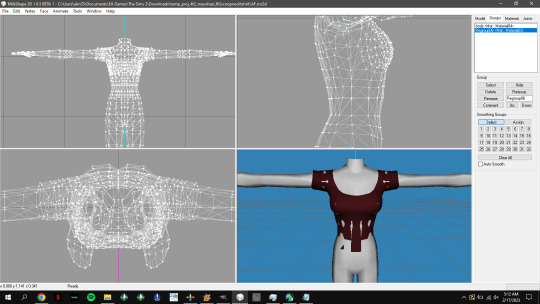
It looks a little weird because I shaped it to fit extraextrasuperclose at the waist...for reasons. If it works, you'll see, when it's up for download someday. Disregard that for now.
I start this process by regrouping the body mesh parts that show outside the clothes. I select all faces that have any part of them showing.
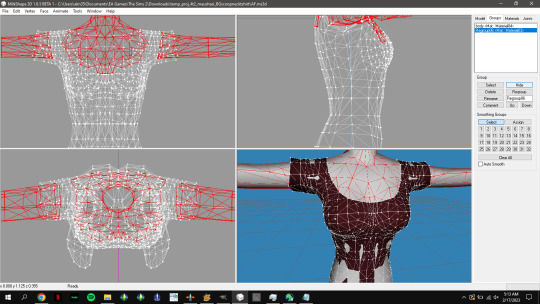
After regrouping, I hide the rest of the body. I try not to delete it until I'm sure I don't need to grab any faces I missed.

I could call that close enough, adjust some bone weights, and leave it like this. Plenty of creators do (or used to). I want the best result possible though, so I do some additional work. (With practice, this joining method is faster and easier anyway.)
Because I selected from the front, I grabbed a few faces of the back which I don't need. Selecting them, I can double check that I don't need them. If the red highlight doesn't show above the shirt's neckline, I know I don't need these faces and can delete them.
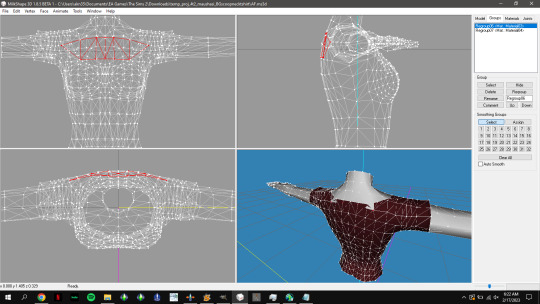
Know how I said I try not to delete the rest of the body until I know I didn't miss any faces I need? Guess who forgot and deleted it too soon this time!
See what I missed?

Oops. Happens. Not too hard to import the body again and get those missing faces. This is why it's important to check all around though. Dammit.
The back is simpler than the front, so I'm starting there again. I like to get "inside" the mesh when I do this process. It's easier to see what vertices I'm selecting and make sure I don't merge anything extra this way.
The only problem with viewing it from inside is it's harder to tell what's what in wireframe only. (I could right click and select "Draw Backfaces" but I prefer to leave it off.) Highlighting the body group gives me an idea of what I'm working with.
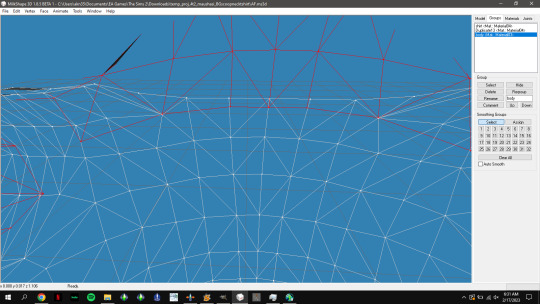
I wind up highlighting the body group like this at various points in the process, to make sure I'm matching edge with edge.
It's important that the clothing group (temporarily named "shirt" in this case) is above the body group in the list. I mess this up on the first vertices so often. Not a big deal to undo and fix the list order, but still. I want the body piece to move to where the clothes piece is, not the other way around.
I usually start in the middle, selecting the center vertex from the clothing piece and the center one from the body.
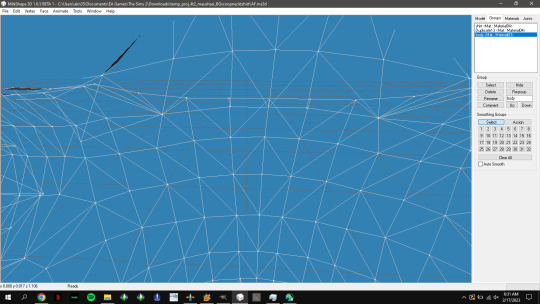
Using "Vertex Data Merge", I join the body vertex to the clothing vertex. This moves the vertex from the lower listed group to meet the vertex from the one higher up the list. (It also matches bone weights to the upper group's vertex.)
For some reason, I didn't take a screenshot until I'd merged the next few vertices. (Maybe I hit the wrong button? I was tired.) So I drew a few arrows onto the screenshot to show what I've merged.

If you see a gap, don't worry, I'll fix that soon.
I keep selecting and merging vertices until I've matched up all of the back's body edge vertices with the nearest clothing edge vertices.
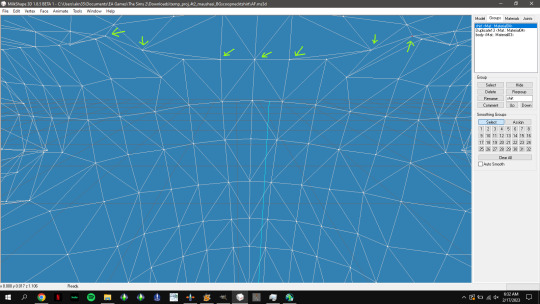
Those gaps you might have noticed? Now I'll deal with those.
Going back "outside" of the mesh and seeing the work I've done on the back, the gaps are much more obvious.

This happens a lot with 4t2 conversions, because TS4 clothes will almost always be higher poly than the TS2 body. This part of the TS2 AF body mesh has three vertices on either side of the center vertex and this particular shirt has four on either side. I fix this by adding new vertices to the body.
First, I select the vertices on either side of the gap. Then, I hide the clothing group. This leaves just the body vertices on either side of the gap selected.
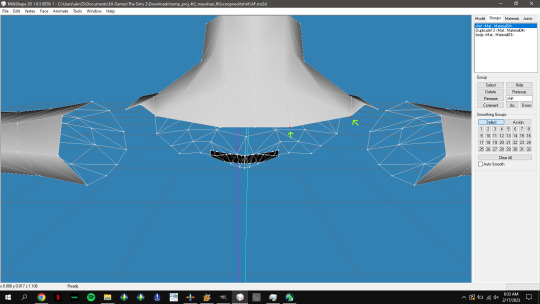
With ONLY these two vertices selected, I use "Vertex > Divide Edge" to make a new vertex between them.

Dividing the edge also divides the face, so the poly count goes up by one each time this is done. And, as you can see, it makes the new face dark. I'll fix that in a moment. I'm focusing on the gap first.
The new vertex is already selected, I select the nearby clothing vertex, and use Vertex Data Merge.

No more gap on that side!

I repeat this on the other side, to close the other gap.

Now to fix those new faces, I first select the vertices all around them. (Zoom in.)
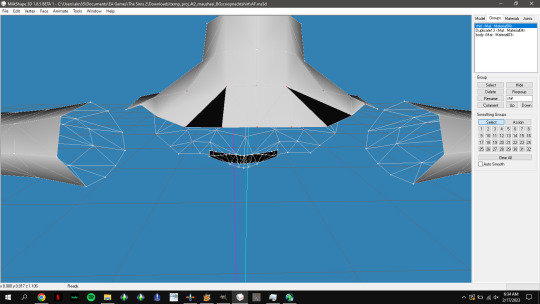
"Align Normals" fixes the dark areas. (This close to the top of the neck, you have to be ABSOLUTELY sure you DON'T align normals on any of the neck edge vertices.)
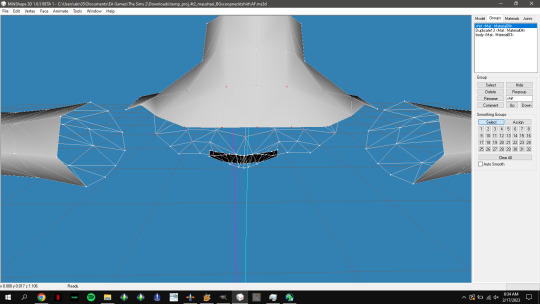
Looking at it like this, you can see the body group is already taking the shape of the neckline.
This seems like a good place to end part one. Part two coming soon!
50 notes
·
View notes
Text
Finding my style
Obviously, wanting to find some degree of success on WebToon, I thought it would be prudent to learn about the platform from others who've been using it longer than I have.
This of course, has led me down a bit of a like, creative self-improvement rabbit hole.
Now, here's the thing. I really like to look at art that is cute and fluffy and pastelly.
But the art that I make is, I think it shows its Disney/Don Bluth roots. My use of saturated colors, almost straight out of the crayon box, I think shows a confidence in building color palettes, but if you knew I struggled to use the color finders in the art programs I use, you'd also see that.
So anyway, I'm procrastinating right now because I'd like a nap and I just cleaned up like four frames yesterday and already colored two today and what I wanted to do heading into this second issue is make the lineworks a little more complex, more props, more environment, more dynamic poses and shots.
My lineworking brain was fine with this.
My coloring brain feels like the switch was too abrupt. I need more practice.
Anyway.
Heading down this rabbit hole, I watched a video recently that went from "artists act like your style is bestowed by a higher power", to literally telling aspiring artists "step one: gather art that you want your art to be like; step two: study and copy this art; congratulations, you now have a style".
🤦♀️🤦♀️🤦♀️
First, I have never heard anyone claim their style came as a gift from the heavens or whatever. Styles are hard earned. The reason you might look at my work and feel a bit of Disney, or you might look at the way I draw strong emotions and maybe see a bit of Ghibli is, those were things I was heavily influenced by as a kid.
It gets me to thinking, with some salt, if I really wanted badly enough to change my style voluntarily, to make it more squishy and pastel, I totally could. But first, would it still be my style? And second, I'm actively working on a graphic novel. I believe if I set my mind to it, I could change my style in about a month. It would be totally jarring for anyone who ever reads my graphic novel.
Now that's not to say that I don't want to grow as an artist. I think there was a lot of growth from issue one to issue two, and even more from issue one to issue three. I want to be better at choosing my colors (I decided to cheat at this and use Google so instead of fighting with the color picker, I can choose an existing color from a swatch). I want to include even more dynamic poses. And a personal goal of mine, I want to be better at drawing clothing folds.
What ever happened to just being yourself?
When you look at some of the oldest art that I'm still able to look at, you can see my style beginning to emerge. I'm sure if you could look at the stuff I was making in high school or middle school, you'd see hints of it.
There is no magic three-step program to magically find your style. There is only making--whether you draw or write or sculpt or whatever, it's one piece and another and another, stacked on top of each other.
On the other hand.......
When it comes to making web comics, I do feel a little left out. I don't think my art looks enough like CalArts or anime/manga to fit in. But that's mostly just because my work is surrounded by the rest of this stuff that's trying to look familiar enough to people to reel them in. I think kind of in isolation, my style is fine. It's very visually clear, it's pretty consistent, my characters are also very distinct. I hope the text is clear--I think it's better when I have the opportunity to space out my letters, but I have yet to get any kind of feedback on that.
At this point, I'm just kind of waiting for my audience? I'm not really sure what else to do. There's not enough material even in the lineworks to make any kind of merch. There is such a slog between where I'm at in the story and anything that would really keep readers' attention, if I'm totally honest.
But anyway, I've been working for literally years to build my style. You can't just purchase a style out of a catalog. Or if you try, you'll only be disappointed when you can't draw exactly like the artists you admire. My style isn't even fixed where it is. It changes by the line--which is why, when creating a graphic novel, persistence and consistency are so important.
0 notes
Photo




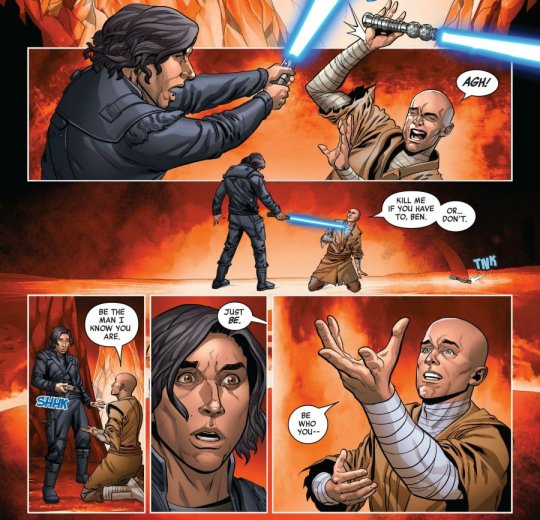
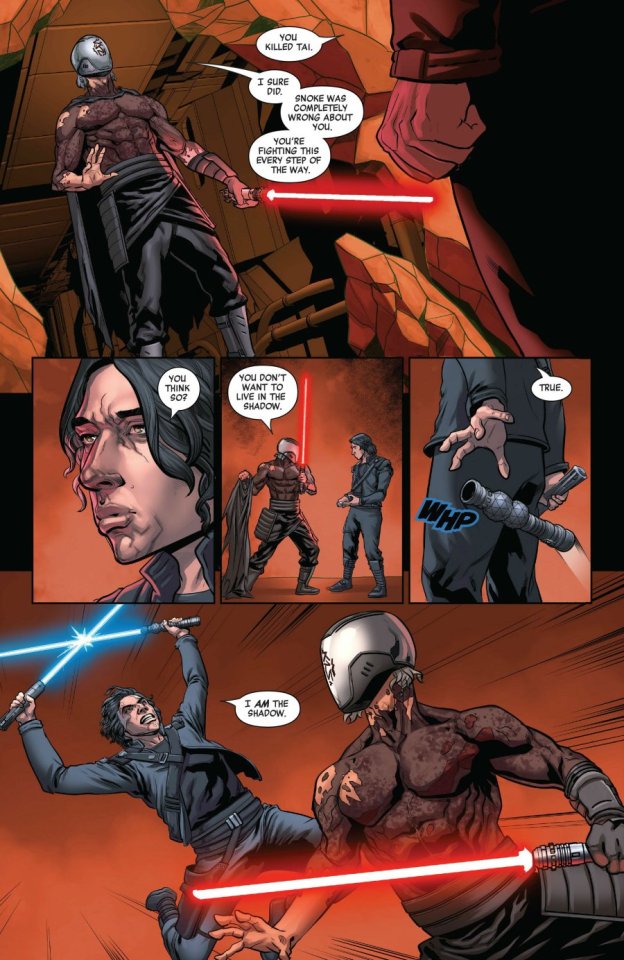
I HAVE STRUGGLED WITH THIS CHARACTER SO MUCH, but I think rereading The Rise of Kylo Ren all at once, as well as the final issue, plus the Age of Resistance - Supreme Leader Snoke and Age of Resistance - Kylo Ren issues (and a bit of the TLJ novelization), have at least somewhat coalesced this character for me.
The burning question with Ben Solo has always been: Why? Why did he not tell anyone about Snoke talking to him in this comic? Why didn’t he go to his mother, whom he knew still loved him? Why did he embrace the dark side?
None of this had ever really been addressed in the canon itself, it was all down to speculation, but nothing I felt I could connect to what we were actually being given with any real solidity in the canon. And issue #4 definitely still feels a little wobbly to me, but I think it at least strung up some connective tissue for me.
In rereading the first issue, I was back to: Why doesn’t Ben go to his mother? If he didn’t attack the school (which I’m not sure how clear it is what he did/didn’t have to do with it, if it truly was Snoke who did it, how much Ben was aware of it, how much of a hand he played in all of this, certainly it makes the timing of the destruction of the Temple INCREDIBLY coincidental if it was Snoke’s plan AND it was the night Luke and Ben fought), if he knows his parents love him (which Age of Resistance - Supreme Leader Snoke [x][x] shows that he does, he literally goes into the same cave as Luke did to show him his fears, the only thing in there is what he brought with him and he sees Luke saying he doesn’t want to fight, which means Ben knows this is true even if he doesn’t want to admit it[x], as well as the TLJ novelization has him knowing that his mother still loves him and he’s angry about it, as well as TFA itself has him not at all surprised that Han’s there to help him and bring him home, even in TLJ he’s snarling about how, oh, is Luke here to save his soul, say Luke forgives him?, which shows that he knows that Luke regrets it and cared about him)--anyway, I’m getting distracted, there’s a lot to go over!
If he didn’t attack the school, if he didn’t want this, why did he run from Leia as much as anyone? In rereading the issue, there’s an interesting flashback that’s place right in the middle of the droid asking Ben where he wants to go, where he’s thinking about his mother and he hesitates. I didn’t really pay attention to the timing the first time because it felt like just a cool dramatic moment to show further flashbacks. But looking for the trends I know Soule is capable of and so often puts in his writing, it struck me that the flashback was specifically set on Luke yelling, “Ben, no!” and Luke in the ruins of the Temple and Ben saying, “I didn’t want this!” [x][x][x]
Thus, I’m left to conclude that he didn’t go to her because he himself couldn’t face her, couldn’t look at all of this storm inside him and find a way out of it. And I think that’s the thing--in reading this issue all at once, it really jumped out at me that the central theme of this comic was about the path people choose in their lives. That there’s an undercurrent of a legacy to live up to, but that that’s just window dressing for a deeper issue--in that Ben Solo doesn’t know what his path is.
On one side, he has a huge legacy to live up--the man he was named for, this larger than life great Jedi, Obi-Wan Kenobi, he never even met him, he hates the name he was given, Ben. He hates the name Solo as well, because it’s a made up name, it’s not real, it’s a lie. [x][x]
This contradiction is fascinating, because he’s named through two different aspects--one, a legacy, and two, a chosen name. Ben Solo hates the legacy name just as much as he hates the name Han Solo created for himself! So the idea that he’s creating his real persona for himself, when he stops being a Jedi and goes to Snoke, is directly contradicted by how much he hates the chosen name, that he says it’s a lie. As if Kylo Ren isn’t a lie he’s hurtling himself towards, too.
Neither of these really seem to be the true problem, for all that they’re genuine things that anger Ben. In the final issue, he does tell Tai, "Even my name isn't a choice. The dark side and the light side both claimed me for their own the moment I was born. Do you know how that feels? Whether it's Luke Skywalker or Snoke, neither one sees me as a person. I'm just a... legacy. Just a set of expectations."
The thing is, Ben Solo is not a reliable narrator. He talks one minute about how the light and the dark are warring over him, even Ren comments on how he’s been fighting this every step of the way, you don’t really want to live in the shadow. “I am the shadow,” Ben replies.[x] He is trying so hard to shove himself onto some path, any path that he thinks will soothe him.
The most emotional part of the issue (or at least one of them) is Tai’s pleading speech to him, the conversation that’s been threaded throughout the entire issue about how you choose your path. Choice is arguably the most important theme of Star Wars, and we see that very clearly in Tai’s conversations with him. Even in the previous issue, he tells Ben that he keeps himself locked up too tight, he’s not really being himself.[x] Ben’s recounting of who Voe is (the other important foil for Ben’s character in this comic) is woven together with how he thinks she never really learned to be herself, rather than measuring herself again him.[x]
Ren, in their very first meeting, says, hey, you know there are other paths, right? [x] On Elphrona, Voe says he must face justice, and Ben shouts back, “You think I’m a murderer, Voe? Is that what you want me to be!?”[x] Tai’s big speech to him in the previous episode is all about, be who you are, which is another way of saying, “Find the path you’re supposed to be on.”[x] Tai’s words to Voe on Elphrona are also, “[Ben] thinks [the Knights of Ren] can help him find his true path.”[x]
And of course, all of the above. Paths and choices and being who you truly are, that Ben Solo couldn’t figure out any of these things for himself. That he didn’t really want to be a Jedi (and that’s fine, it’s not the path for everyone) and we see, we see that he could have chosen otherwise, that Tai offers him a chance to actually walk away from all of it and just go help people, we see the hesitation there before Ren kills Tai and Ben makes his choice. Because he may not feel like he had any choices, but Tai showed that he absolutely did.
Even when he truly falls into the dark--so completely that a multitude of people feel it, Leia, Snoke, Rey, Palpatine, they all sense it--it’s framed around the idea of, “I’m not anyone special, so I can do what I want.”
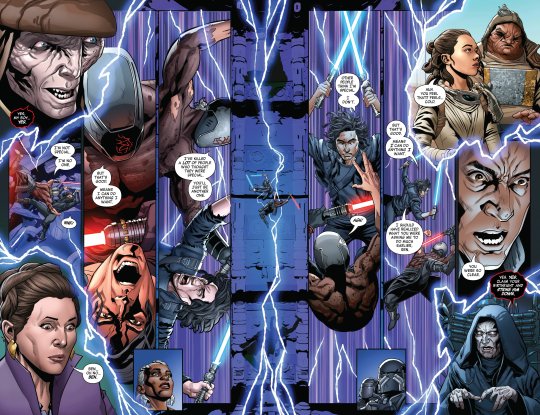
All of this coalesced for me into two things, especially once I added in other Ben Solo appearances in canon--this is someone who has no strong sense of self or the path he’s meant to be on, so he just sort of careens wildly from one bad choice to the next, each time hoping that it’ll feel like the right path, rather than doing the really hard work of looking inside himself and not just locking everything up into a little box.
And, two, he is further trying to gain that sense of self through others. Even when he’s not fully aware of it, he keeps walking the same paths they do--like on Dagobah, when he goes into the same cave Luke did, to face his inner fears, he’s walking the same path his uncle did.[x]
When he’s offered a choice, when Tai asks him to come back, if you want, you can absolutely read that glowy red backdrop as being similar to Anakin’s fight with Obi-Wan on Mustafar.
And certainly, given that Soule was the one to write Darth Vader bleeding his kyber crystal, we can draw parallels between that and Kylo Ren bleeding his:
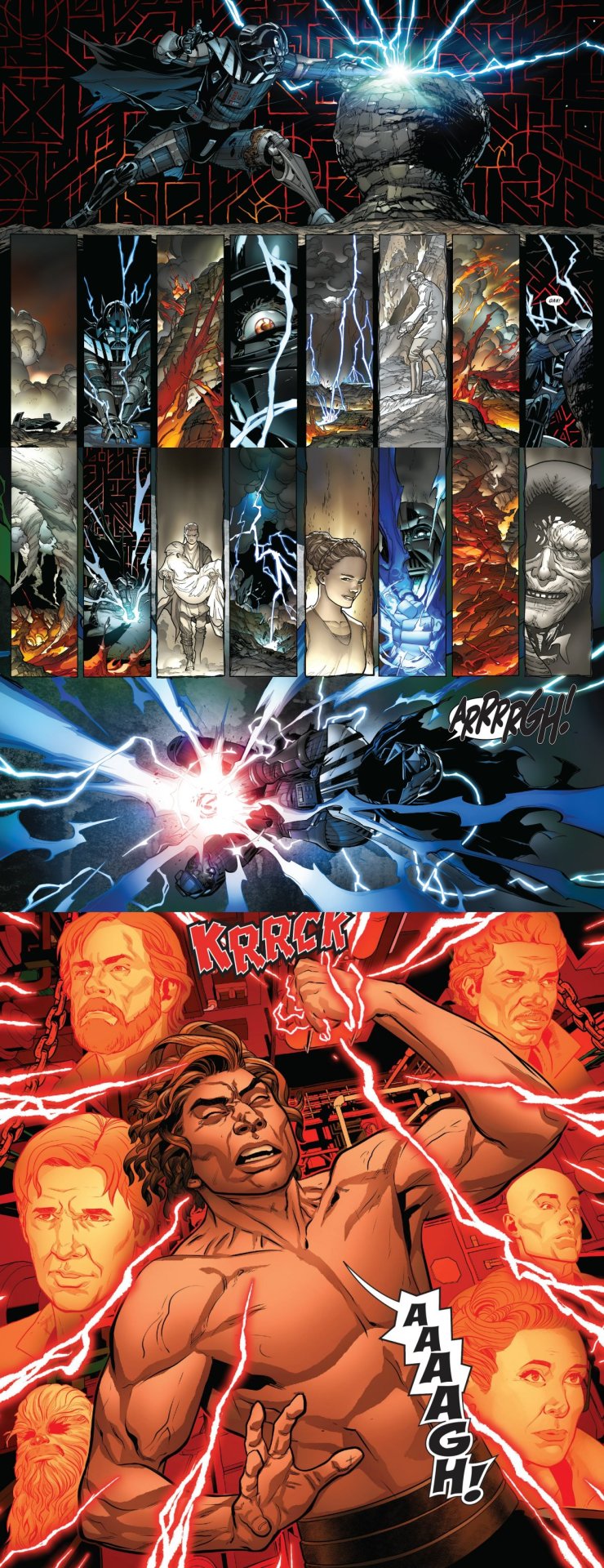
And that’s one of the things that the character keeps coming back to--and it’s a huge theme for Ben Solo, that he’s constantly being compared to Vader, by others and by himself. Sure, part of it is that I assume that’s just how bleeding a kyber crystal goes, but the parallels between Kylo and Vader (and thus between Anakin and Ben) do a lot to highlight the issues between them both, that we see TROKR’s visuals are echoing Dark Lord of the Sith’s scene, as Kylo is very defined by Vader in an out-of-universe meta way.
But also within the universe, he keeps comparing himself to Vader and is compared to Vader by others, because that’s kind of the point, that it’s not just too much power in an unstable person (though, that, too) or that they were born evil (no, they weren’t), but that they both couldn’t really look at themselves or the choices set before them, to either actually commit to the path they were on or to find another one. That they both were still loved even after their fall. That they both had people pleading with them to make a better choice.
"Leave [the mask]. I said leave it! You cannot hide behind a mask here. You cannot pretend to be Vader in this place,” Snoke says is Age of Resistance - Supreme Leader Snoke [x]
“This is where I will succeed. ...where Vader failed,” says Kylo Ren in Age of Resistance - Kylo Ren. [x]
“There’s too much Vader in him,” Han says in The Force Awakens.
“A new Vader. Now I fear... I was mistaken. Take that ridiculous [mask] off,” Snoke says, not long before Kylo smashes the mask to pieces, in The Last Jedi.
It’s contradicted by Kylo’s theme of, “Let the past die. Kill it, if you have to.” in TLJ, but it’s pretty par for the course with him, where he careens back and forth between one decision one moment and another the next, that he still has no idea what his true path is meant to be.
So much of his character was patterned off of Darth Vader, both in universe and out of universe, it seems only fitting that he, like his grandfather before him, has no real sense of self or the willingness to look within himself to find what that path really is, whether it means actually committing to the Jedi path and understanding yourself and working to let go of your fears, or whether it’s finding a path away from the Jedi.
And both of them felt like their power must be used for something. "[We're going to] some planet called Elphrona. All this way to find some old junk Master Luke will lock away in his temple and never use. [....] He's an amazing teacher, very strong. I've learned so much from him... but he never seems to want to let me use any of it."[x]
Ultimately, at the end of it, it seems like Ben Solo was someone who didn’t really know what he wanted out of his life and so he kept looking for the thing that would finally make him feel like it was the right path, except he kept looking to those outside himself to figure that out, whether to reject what he thought they were making him into or to use them as a measuring stick to define himself, and the only sliver of it that he ever seemed to find was when he finally stopped trying to force everything to make sense and focused on someone else for what he could do for them, instead of himself.
290 notes
·
View notes
Text
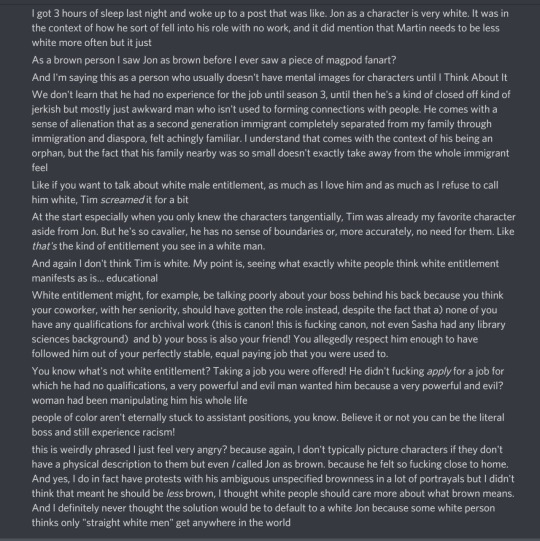
So this was sent to me by @atiredpan weeks ago when the White Jon conversation was very live and I'm posting it (belatedly) with their blessing (they didn't want to put it up publicly and have it seem like an attack which I really very much appreciate but wouldn't have minded) and I percolated for a few days and then got very busy for a few weeks. Response follows.
So I feel weird about how I'm responding to this stuff, I'm launching rapidly into taking about/explaining my own experience in a way I'm worried maybe comes across as a direct comparison. It kind of feels like I'm talking in a way that's like brushing off your experience and saying OK BUT HERE'S WHY I'M RIGHT and that's not what I'm trying to do, it's just that there's not much I can usefully add to what you've said - you know your experience better than I do, and I'm not gonna go around trying to read into it or reexplain it. So I'm going to talk about where I am/have been coming from, but not with the intention of countering your points, all of which I think really resonate.
First off, the post where I was like "Jon is white and if you disagree you're Wrong" was, unreservedly, just a shitty post and I'm not suprised it upset a lot of people. I'm really very sorry about that, it was thoughtlessly written and pretty stupidly posted.
I totally get that my whiteness has fed into how I hced Jon (and as I think I've said before I saw Jon a certain way well before I engaged with any fanworks, just as you did). There's a lot of reasons I imagined Jon as white from pretty early on, a non-negligible one of which was like...That's Jonny. This is a podcast by Jonny, about a character with the same name and mannerisms as Jonny, and Jonny is extremely white. It would have felt weird, when I was listening to TMA as a Friend Podcast, to stick a brown face onto what at least appeared at the time to basically be a self-insert character of my white friend. Now that's a really personal thing informed less by the story and more by the circumstances under which I've interacted with it, but it certainly laid a baseline. I didn't really have a clear mental picture of Jon (or most of the characters) for a looooooong time (for an artist I'm really not a very visual thinker) but I had a few sort of mental sketches (Jon is short white balding and awkward, Martin is tall biracial and scruffy Basira is fat and somali Melanie is my friend from work etc) which I developed a long time before I encountered fanworks.
I saw the alienation you mentioned and I connected it to class and gender, not race, because I’ve met a lot of cis men, white and otherwise, who interpolate trauma, class insecurity, insecurity about their own abilities, and so on into withdrawal, denial and snappiness. So for me I had an interpretation of that element of his personality which was pretty much race-neutral, and then I had these existing cues leading me to assuming he was white (largely that Jonny is white, but also wee stuff in the story that...it’s not like anything substantial enough to remember, let alone justify, but there were certainly interactions that pinged whiteness for me personally)
There are actually iirc a few throwaway references to Jon being promoted above more qualified candidates throughout (or at least I thought I knew that before s5), but the time I decided I thought White Jon was an obvious conclusion was of course the conversation where Sasha expresses frustration about it. and the context of that conclusion (at least as far as I can see) wasn't "people of colour can only exist in subservient positions/defined by oppression" but was informed by two things that were going on with my life around the time that episode aired
I had been having several conversations with friends of mine (and largely friends of Jonny's) who work in London in the museums/archiving sector and who are the only women of colour in whole departments or even whole museums, and who experience so little career mobility compared to their less-qualified white counterparts (we're talking about women graduating top of their class at Oxbridge with anthropology or library science masters and stellar original research, with a decade or more of impeccable work experience and acting up, being left in internship and low-grade positions, while white men who "fit the culture" but have 0 museums experience sail into upper management positions and then stay there until they retire). So I'd come almost directly from these conversations into what to me sounded like exactly the same gripe in TMA.
I'd been at that point working for about a year and a half on co-coordinating the anti-oppression committee in my workplace, which was a very Good Progressive Activist Charity with Good Lefty Principles, and over the course of experience sharing and discussions both with colleagues of colour and along lines of wealth, disability, class etc, I was very much confronted with the realisation of how much 'being adequately qualified' meant different things for middle-class good-university white men vs much more highly skilled and hardworking women of colour or people of different class and wealth backgrounds. Obviously I'd known that before in principle, but not really having been in Salaried Workplaces (as opposed to like. service and retail hourlies) I hadn’t got so up close and personal with it. So that was also very fresh in my mind, this like...big substantial experience of how Good, Well-Meaning, Caring, Thoughtful, Woke white men just........did not need to think about this. at all. and were startled and discomforted to face it. and that this was also true of most white middle-class women. and these conversations were really carved down the middle between white middle-class European women saying ‘this is such a surprise when we have such an equitable hiring policy and diverse staff, that there’s this gender gap’ and women of colour in the room wearily saying ‘yeah, there’s a gender gap, there’s always a gender gap and it is always a racialised gender gap’ so yeah I was definitely thinking about the intersection between being passed over at work because of gender and because of race.
The point about Tim is interesting because I think for me what’s getting lost is that I don’t think Jon is entitled as like...a Character Trait. He’s not like...Toxic Masculinity Man. He is very anxious about boundaries and about his own capacity to do harm. But it has to be pointed out to him where he’s doing harm. He doesn’t notice where he’s been unfairly advantaged, and that’s to me much more reflective of most people’s relationship to white or male entitlement.
As I say, that exchange with Tim and Sasha cemented the Jon Is White hc in my head specifically because it was so reflective of conversations I had had with women of colour working in similar workplaces, about white men, usually about white men they generally liked or at least didn’t have beef with beyond their unfair advantages.
It seems odd to me to frame ‘bitching about your boss on your friend’s behalf to make her feel better’ as more similar to white entitlement/white privilege than any of that tbh? That’s just...being friends with someone?
Anyway I recognise that it’s not white entitlement to accept a job. Obviously it’s not, it’s just sensible under the circumstances, you get lucky and you grab it. For me my sense of Jon as white-because-of-this is not “he took a job he shouldn’t have taken,” it’s more about his obliviousness to the impact he has on others, and also primarily how people react to him. The interaction between Sasha and Tim is saturated with the of course it would be him I mentioned above, but even before that he walks through the world not expecting to have to think about anything but his conscious decisions, and he’s caught aback when people see him as out of place or as having power above his station.
I think it’s impossible to extricate ‘this is where my head was at’ from that interpretation, and also like obviously my own whiteness is a big factor. And not just my own personal whiteness but the place I grew up (which was 98.3% white) and the world which reflects back whiteness. So this is in no way intended as a bolshy This Is The Correct Headcanon the way my Bad Post was bc examining it I’m like...yeah I mean this is about how I personally interpreted this based on where I was at at the time. But I do feel like there’s some communication gap in what it is about this unqualified promotion thing that pinged me - it’s not that All Bosses Must Be White And All Brown People Must Be Downtrod, it’s something quite specific about the tone and tenor of the interactions around the getting-a-job.
But also? Idk. Kind of unrelatedly, and people obviously should feel free to disagree with me on this, it feels kind of off to frame this as defaulting to a white Jon? I sort of think that my idea of Jon as white is very much not ‘white until proven otherwise’ - part of the reason for my original strident tone was that I felt that I was being expected to drop a headcanon I had for specific reasons and default to the fanon version of Jon without actually having any reason other than ‘this is how the community thinks he should look,’ and without really understanding anything about what that means, and while obviously defaulting to a non-white headcanon isn’t like...entrenched in the way that defaulting to a white headcanon is, it does seem to me like this is perhaps part of why white fans slap brown skin onto a character without thinking into what that means or why they’re doing it.
The thing I’m struggling with as regards my personal headcanon here is that I could decide to only ever draw Jon as Fanon Jon, but it wouldn’t be because I had strong reasons to see him that way, it wouldn’t be the same as why you see Jon as brown, or why I see like...Melanie as Indian, it would literally be Default To Standard in a way it isn’t for you. And I don’t feel that I have Defaulted To Whiteness, or where I have it is for reasons specifically to do with Jon (I visualised Jon as white because I visualised him as Jonny, who is white), not because I think every character is White Until Proven Otherwise. Like, my reasons for understanding Jon as white may be bad reasons, but they are reasons, not post-hoc excuses (I can’t like...prove that. but I know it to be true at least on a conscious level). I didn’t go Oh Jon Is White Because Everyone Is Unless I Have Reason To Think They Aren’t, Hooray, Here Is A Post-Hoc Justification For Why It Isn’t Racist To Think That. So while I am totally on board with the idea that it may be shitty, harmful or poorly thought through to hc Jon as white, I’m not sure I can fully see it in myself as being default. But I do understand that that isn’t necessarily what came across in my original short post.
Honestly, the reason I took issue with Fanon Jon and Fanon Martin in such a bolshy way in the first place was that I didn’t get why these characters were universally seen as Asian and white, respectively, and had such strong and consistent fanon images, when none of the other characters did, and when I was seeing people drawing people like Sasha and Melanie and Tim as white way more when in my mind there was no reason to assume they were white. On an emotional level I guess I think either there’s Fanon As Lore, or there’s no fanon (and I prefer the latter) and my discomfort came from the place that the one character I absolutely saw as coded as white in the core cast had this one really specific Ambiguously Brown Fanon Look (which from what I’d seen at the time didn’t seem to be like...backed with anything or coming from any personal interpretation for most of the white fans I was seeing on like Twitter and Tumblr) but white headcanons are everywhere for characters like Melanie or Sasha or Georgie, who seemed to me to be unambiguously people of colour, or characters like Tim or Martin (who could perfectly reasonably be people of colour and who I hc as Rroma and biracial respectively)? I don’t know, it’s difficult to express, but I find it frustrating.
#tma#White Jon#idk sorry to post this so separate from the rest of the conversation I have been Busy
28 notes
·
View notes
Text
Halloween Reviews — 2001: A Space Odyssey
Ségolène Sorokina
Assoc. Fiction Editor
A visual tapestry and musical opera, but devoid of interesting characters or a mature story structure.
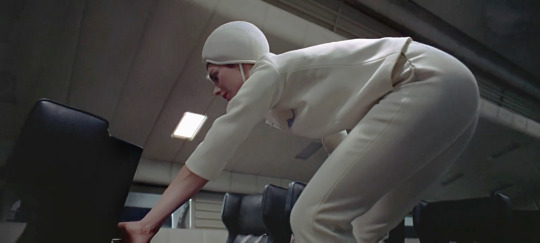
Heather Downham (as Miss Simmons) in the Opening Scene of Act II in “2001: A Space Odyssey”
This is a film that fits into every director’s, film student’s, and every critic’s education of the film medium. It is a prerequisite on the syllabus of every curriculum for movie makers. 2001: A Space Odyssey was one of the most influential works of science-fiction and cinema to come out of the Cold War period, yet it would be entirely wrong to call it a movie. In fact, it is a terrible movie — but it is a remarkable film.
Because every film studies wonk and their mother has an opinion on the film, I will be brief and remain true to the purpose of reviewing it, not lavishing over it. That is to say, I don’t give a flying hoodah what the “deeper meaning” or “wider vision” of 2001: A Space Odyssey is interpreted to be by bandwagon film critics who are too afraid to feel like they’re missing out on the punchline to be honest and objective about the Clarke’s and Kubrick’s failings.
A movie is not meant to be something that has to be discussed afterwards. A movie is not something that requires the viewer to read the book, or take a class to understand. A movie is not something that forces people to sit through 85 minutes of dead air, offering no explanation, and is entirely devoid of any scintilla, any semblance, of a storyline, character arc, or plot.
Containing horror elements, “2001” fits closely enough into the Halloween line-up of reviews, as (#5), if not only because of its inspiration on other horror genre motion pictures.
Quite frankly, 2001: A Space Odyssey is boring as hell. And it is a horrible movie. To give an illustration of how empty the film “2001” is, the original script had about 17,000 words in it. Most of this is description of the sci-fi elements and screen directions. In the end, the film had about 5,000 words of dialogue in it, total. That comes down to about 20 minutes of speech. . . The movie is 139 minutes long.
The film’s defenders are quick to claim that its emptiness and barren quality are an allegory for the emptiness of space. They never seen to stop for a moment however, perhaps in one of the film’s 30-minute long stretches of drawn out ‘alternative’ content, to consider why the film needs such a defence. People do not like it. Quite plainly, it is a bad movie. Defining why it is bad, using words like “allegory,” “metaphor,” and “artistic vision” doesn’t change the fact that it is unwatchable, it just explains how a production crew could look at 5 minutes of black screen in a major motion picture and think to themselves, “The audience will understand why they spent 5 minutes of their life looking at a dead screen. Because it says something about what it means to watch, blah, blah, blah.”
This movie is a film critic’s movie. It gives people plenty to analyse. And it has exceptional cinematography. For a film maker, it’s easy to see why the writers and directors did what they did, and how good it turned out — especially for an audience in the heat of the Cold War-era Space Race, who had quite literally never seen anything like it before. The long, operatic sequences probably mean a great deal to people who were born in the 1950’s and for them 2001: A Space Odyssey was Kubrick putting the last half-century on the silver screen, in colour film, for the first time.
Cinematically, it is exceptional at what it is and what it wants to do. But as a movie — and just a movie — it is quite poor. The entire plot of the film is that all-powerful aliens have been observing life on Earth since before life humanity came into existence, and during the Space Age people discover one of their relics, which leads to the capture of one human being in Jupiter’s orbit, who is killed and reborn as an alien himself. . . That’s it.
What the hell that has to do with the elementary notions of a beginning, middle, and end — a rising conflict, a climax, and a resolution — is anyone’s guess. There is no plot to speak of. Kubrick himself said the picture was more of an exploration of different concepts than a straight forward story. When I watch a film, I’m kind of looking for a storyline; That’s the whole point. A movie is not an art gallery of stills and frames juxtaposed together through editing, it is a cohesive and contained world onto itself: A story.
A movie is a casual experience, not a class requirement or a way to coerce the viewer into writing some kind of thesis. A viewer needs a reason to watch a film, and not because other people watch it or because it’s a cultural phenomenon. In this way, 2001: A Space Odyssey is no different than a trashy boyband, since they both have merits to justify their fame, but only get continued fame and discussion as a previous result of existing acclaim. But that is not enough to idolise a failed film. Reading Stanley Kubrick’s name on the playbill is not enough. Staring at Heather Downham’s ass is not enough.
This film does not deserve to use the title “Odyssey” at all, not more than some cheap gladiator flic would, because the Odyssey had a clear progression of characters, and themes, and resolutions which Homer was capable of creating over a long oracle tradition, and which Clarke and Kubrick fumble to represent on-screen. They should have stuck to long, narrative fiction, because whatever “2001” is trying to be — and even it doesn’t know — this doesn’t work as a movie. The film is polished on the surface, but entirely experimental, and therefore superficial, but above all boring, dull, and dragging on too long.
And nothing in that plot is ground-breaking or new at all. The visuals might be first-of-their-kind on big-budget films, but the ideas of aliens, aliens linked with the Cold War, and computers being evil are old and hackneyed ones. Anyone deluded enough to unwavering call the directors ahead of their time need only to look at the abysmal depiction of women in the film: Pink-wearing, skin-tight, ass-in-the air stewardesses and receptionists, completely subservient to male control and design. Perhaps the film is making a statement that Russian women are liberated and American women are oppressed, yet even the female Soviet scientists do not speak for themselves, but elect the singular male doctor to ask the difficult questions of Floyd instead.
Consider Star Trek, which was released 10 years after 2001: A Space Odyssey, and draws heavily from it, yet Star Trek is also capable of making social commentary. Unfortunately, Star Trek as well, for all its preachings about ascending beyond economic struggles and societal biases, still echoes them. Star Trek shifts the focus from societal bias of the system to implicit bias of the individual, which is a human trait that follows the theme into the future, creating the conflict of the franchise, yet the franchise also has a serious problem with the depiction of women all the way from the Original Series, through the Picard saga, and into the later sequels and spin-offs like Voyager, and current reboots. There’s a major difference between being a liberated woman who still has needs, and being an intergalactic sex toy. Most of my friends are sex-crazed lunatics, but that doesn’t mean they don’t choose to be, and it doesn’t mean they view themselves as second to men or their actions to benefit men generally at all, just as a man chasing several women is hardly doing it for their benefit.
The social commentary is absent in “2001.” The purpose of this might be to make the point by ‘feeling’ rather than telling, but the problem of gently nudging people in a pompous way to feel something instead of sincerely telling them directly is that people will interpret things as they want, and are very resistant to change. If a viewer thinks that lying to Russians because their foreigners is okay to do, then watching Kubrick make a passive aggressive statement about how duplicity can backfire is not going to change their minds — it will only embolden those who disagree with him more, and for those who already agree with him he’s just preaching to the choir. And if someone did take away the wrong message, who’s to say it’s the wrong message anyway, if it’s all “open to interpretation,” ie. an evasion by the writers from making their true feelings known.
And as a small note, the Russian dialogue in the film is horrible. The actors have poor pronunciation, the words they are speaking are incorrect, and the grammatical structure was erroneous. Clarke, Kubrick, and MGM had $10 Million Dollars, and the time to film 30-minutes of people running around in ape suits fighting pig puppets, but they couldn’t do a simple grammar check? They couldn’t cast a single Russian actor?! The four Russians are played by: Leonard Rossiter, French-English, British; Margaret Tyzack, German-English, British; Maya Koumani, Greek-English, British; Krystyna Marr, Polish-German, American.
These tropes were used in different ways, such as not seeing an alien until the very end, and after being pioneered by Kubrick became easy fodder for space movies and the science fiction genre to copy, but don’t actually have any deeper substance. It is a well known fact that Stanley Kubrick did not like the Cold War, so people going into drawn out arguments for why the first 25 minutes of the film was literally thrown away just to make some esoteric statement about how backward and barbaric the Cold War was, are really just gluttons for punishing themselves and inflicting that bias on others.
A fourth (25%) of the runtime of a 2-hour long movie, the first 25 minutes, is completely unwatchable, AND, frustratingly so, it has absolutely nothing to do with the remaining 115 minutes of the film. How in the hell the editors did not cut this garbage out of the movie for its major release debut is incomprehensible. Pulling this kind of raw poor taste is exactly the kind of thing that gives a bad name to ‘artistic freedom.’
The only semblance of a plot is the part everyone thinks about when they think of 2001: A Space Odyssey, the deep space voyage with the supercomputer HAL-9000, pronounced initially as “H.-A.-L.-Niner-Zero-Zero-Zero,” then later, obviously just as “Hal Nine Thousand.”
This minor sequence in the movie saves the film, as far as popular culture and the average person are concerned. HAL-9000 is a perfect and incorruptible machine, tasked with guiding the mission to Jupiter, along with a two-man crew, and payload of three cryo-sleep scientists.
Immediately to the audience, it seems like a stupid idea. Why would anyone go to a gas planet like Jupiter? Why would the AI be put in charge of everything? Why is half the crew in hibernation? All these questions added together make a catastrophe inevitable. HAL mentions as much to one of the crew members himself, asking him if he, too, thought the mission was “odd.” It is explained later that the reason for all these difficulties are the result of a specific miscalculation by the American command structure back on Earth.
HAL tells the crew that communications will fail in 72 hours, but he does not know why, and he never gives an explanation for why he knows this in the film. The crew check that nothing is wrong, and phone NASA (or its fictional equivalent), and NASA tells them HAL is malfunctioning. It is possible that NASA is lying to the crew, or it is possible that HAL got something wrong.
Because HAL was designed to be a perfect robot, this possible malfunction worries the crew, who conspire in secrecy to destroy HAL and take control of the ship. HAL, in true machine fashion, wastes no time in shooting one of the crew out into space, and as his crewmate goes to retrieve the body, HAL kills the rest of the crew and locks him out.
At this point, HAL appears to be acting irrationally and emotionally like a human would. After the last surviving crew member kills HAL, he finds out that the reason HAL killed the crew is because he was programmed by the Americans that under no circumstances whatsoever is he to be shut off.
So what appeared to be self-preservation was actually just the mechanical process of fulfilling his commands. What makes HAL a complex character is that his human caretakers take care of and are taken care of by him. HAL is in total control of the ship, but only because the humans told him to be, as the crew waste their days away drawing sketches, and playing chess, and watching videos. The audience is left to wonder if decommissioning HAL is any different from killing a servant who has gotten sick and is therefore no longer of any use.
When HAL discovers the crew’s plot to take over the ship, HAL is aware that the crew want to ensure they make it to Jupiter and fear HAL would get in the way of that. HAL, however, is also aware that the USAA or NASA or whatever wanted HAL to give the crew a secret message about the aliens after reaching Jupiter. HAL is put in a difficult position, because he believes it is important to get the crew to Jupiter to deliver the message to them, but it is also important to keep the message from them and stay in absolute control of the ship until they get there.
HAL at this point has a logic break and malfunctions, killing the crew, and thereby inadvertently destroying the mission he was acting to protect. When Bowman resets HAL’s memory banks, HAL admits to Bowman that he knows he malfunctioned in killing the crew, and tells him that he/it is afraid to die. This leaves the audience to interpret whether HAL is lying to stop himself getting shut off, so he can compete the mission himself with no crew, or if HAL genuinely broke down and malfunctioned when he murdered the hibernating crew members because he was afraid that the crew would destroy him after the found out what he had done.
There is also something to be said about the fact that Bowman risked his life to retrieve Poole’s dead body, but after it becomes an impediment that threatens his own life, he throws it back out into dead space. It is in this moment that Bowman becomes a dead man himself, since HAL has killed everyone else and damaged the ship for human habitation, making a return trip impossible even if HAL is defeated.
HAL is known to lie to the crew, but it could be influenced by self-preservation and dilemmas, causing something called confusion. But then again, HAL is programmed to lie, so to HAL lying would be a form of truth, because it was told that doing the wrong thing was the right thing, for a greater purpose. And yet, again, HAL cruelly murders the crew when he could have left them frozen, even if it was necessary for it to kill Poole and Bowman, which is as much malfunctional as it is emotional.
HAL-9000 is the strong point of the entire movie. But that being said, HAL does not have a character arch, since HAL never changes over the entire course of the film. The crew only learns about HAL’s motives after they kill him, and despite HAL acting irrationally and inexplicably several times, the movie gives a superficial explanation that HAL has human-interface protocols built-in to sound more palatable to users, nullifying the question of HAL’s possible growth.
HAL did everything it did because humans told it to. Not once did HAL contravene the human directive in it’s own interest. The tragedy of the HAL character is a misinterpretation and accident of logical data. Additionally, the single most important point of HAL’s character — that it doesn’t make mistakes — is severely undercut when HAL makes three mistakes: incorrectly predicting the communicator would break when it didn’t, killing the crew thus undermining the mission, and ultimately being unable to stop itself being erased by Bowman. Part of that discrepancy has to come down to poor writing.
The idea of HAL is great writing. HAL is not a human character, and it’s the robot’s distinct lack of humanity that makes it the most human character of the film.
Bowman, Poole, and Floyd are not characters. They believe nothing, they say nothing, they do nothing. The audience feels nothing for them. When HAL threw Poole out of the spaceship, careening into space, I burst out laughing because of how absurd the image of him getting comically, cosmically tossed out of the veritable window was. When Bowman sees this, he doesn’t even react, but robotically and emotionlessly asks HAL what went wrong, and HAL lies to him by telling him it doesn’t have enough information to know.
After the HAL storyline ends, Bowman receives a transmission that reveals to him that HAL was given a message to lock down the crew and control the ship because the U.S. Government wanted to keep the aliens a secret, even from their own crew who ultimately died because of the mistake. The original script has Bowman re-establish contact with America (I say “America” and not “Earth” because the film makes clear that the U.S. is not cooperating with other countries), and NASA sends him the message. That is cut in the final film, with Bowman just discovering the message, either because HAL gave it to Bowman as a final act of protecting the mission, or much more likely that HAL being deleted removed a barrier from accessing the message. This further makes the point of why HAL could not allow the crew to ‘unplug’ it, since guarding the message was HAL’s personal mission.
The HAL chapter is marred with long pauses, like waiting literal minutes for the stupid space popcorn balls to turn around and move back and forth, or watching Bowman stare silently into a screen. Many people like the music, but the music usage is paradoxical. Since space is silent, to use ballads of music is just as much a choice as to use dialogue — music is no more “pure” or “non-human” than speech is — and watching entire scores of music play out of a static backdrop would be interesting at the live orchestra, but this is a stereo recording underplaying a film, so it hardly has the same effect. This is a limit, and choice to pursue that limit, which was weak on the part of the writers. A soundtrack is not supposed to take centre stage; people can buy the CD later, but they want to see the movie now.
The movie makes the decision to skip over the rest of the journey to Jupiter, cut out all the dialogue and character exploration between Bowman and NASA, and jumps right to the end of the movie — a twenty-minute-long session of meaningless strobe lights.
All the storyline and extra HAL content that could have been included, and they made the decision to, again, burn the whole film continuity down as a middle finger to the audience and the producers — to balk conventional ‘expectation.’ It is a horrible choice. The writers said they wanted to create something alien and never imagined before about what a different world would be like. They said they had some difficulty translating the idea: And they decided on rainbow lights and lava lamps. Twenty. Straight. Uninterrupted. Minutes of it.
This is made even more BS that the directors put a title card right in the middle of the HAL sequence, in front of this, called “Intermission.” Is this what audiences were returning for? One unhappy movie-goers said, “People call this movie genius: There are 5 minutes of black screen in the film. No music. No picture. Just an empty frame of dead air. How genius can that be? Is my turned-off television screen also a genius of cinema? Is a blank piece of paper now some artistic statement? The last half hour of the movie is flashing light in people’s faces for 30 minutes, with no dialogue. A complete bore and an insult. One of the most overrated films in history.”
Skipping over about an hour of rubbish in the film, it starts to become compelling. There probably exists a fan edit out there somewhere that recut the film, trimming it down to 45 minutes. The monkey scene — “Dawn of Man” — could be 2 minutes. (As a side point, it shoud be pointed out that humans are not descended from chimpanzees, but that chimpanzees and humans share a common origin, much like whales and elephants do.) The space stewardesses fumbling to walk and carrying lunch trays can go. Floyd’s daughter plays no role whatsoever. Floyd can meet the Soviets, talk about the virus, then give the Moon presentation about the virus being a cover story, and then they go to the alien artifact, and then it cuts to HAL-9000. After HAL dies, there is a 60-second sequence of ‘light gates’ to convey the ship was abducted, and then the screen fades to black. The End. What happens? Who knows. Not much different from the original.
I’ve read some of the commentary on this film, such as by Roger Ebert (or Robert Egert, or whatever his name is) and the always come off as snobs and pricks, even suggesting audiences should requires some minimum score on an entrance exam to see the movie in theatres. That is exactly the problem with 2001: A Space Odyssey, snobbery. The snobbish idea that it means something more when it needs to, and that it doesn’t when it doesn’t need to. There is a reason people find it “annoying. . . confusing. . . infuriating. . . frustrating. . . crazy. . . unwatchable.” These are not people who hate movies or Kubrick, these are the same people who like the HAL story and the Moon voyage parts. But a movie, even about aliens, cannot be alien itself. The movie is supposed to be the viewer’s friend, and guide the viewer through the experience of the alien and the unknown. Alienating the audience is counterproductive in every measure.
Everyone — every single person you ask — calls 2001: A Space Odyssey a work of “art.” Art. Not movie, art. Not entertaining, art. Not good work, but good art. Well, just what the hell is art? I don’t want obstinate art, I want a good film. I’ve seen films that are artistic and compelling. I’ve seen films that are interesting but shallow. A Bruce Lee movie doesn’t have much in the way of plot, but you get to see Bruce Lee do some real-life kung fu and amazing stunts, and it’s still fun. But “2001” more subtle and ‘lava-lampy,’ so much so it is impossible to get lost into the experience without becoming aware of yourself at certain moments and wanting to either turn the show off, or just suffer through it because everyone else seemed to. Film critics might get paid to watch 10 minutes of dead air, but the directors don’t have the right to waste people’s time. At the end of the day, 2001: A Space Odyssey isn’t really intellectual at all; Anyone who’s actually interested in learning something or seeing something new would be better off going to the bookshop or a city gallery, this is still just a movie, and no one can claim they are smart for just sitting there and passively consuming a piece of popular media, not even haughty sci-fi fans. There is a difference between watching a science-fiction movie and being a real scientist!
Film snobs and fusty critics who rewatch the damn thing 10-times don’t get to just designate the whole package as good. Maybe the reason such contrarians like the film is just because so many people don’t, and they feel cultured or superior for pretending they’re ‘in on’ the experience. The movie has some high points and innovative structures, but fails as a cohesive unit. It’s a meticulously crafted bomb. Anyone studying the film has to focus on the camera angles, the underlying themes, and the audience reception more than the plot — because there is no plot.
This is a film which, if you like esoteric and avant-garde, you can watch this film and then spend the rest of your time reading the book and the script notes and the celebratory review articles and the academic theses and watching the director and cast interviews, to actually understand what the hell is going on. That is certainly its own kind of experience, but it is not a movie experience. That is to say, it’s not fun.
If you want to watch a good movie, skip over everything except the HAL arch, watch a 3-minute synopsis on what you missed over the other 90 minutes, and then move on with your life doing more important things, or watching better movies. Even Kubrick’s other movies are drawn-out and slow, but at least they have established characters and a point, as well as a clandestine “moral of the story” under the surface. If that seems like to much of a hassle, just give 2001: A Space Odyssey a hard pass; it’s not worth seeing. This is one of those trailblazing films where the innumerable imitators actually picked up the gauntlet, evolved the themes, and did it better.

Overall Score: 2 out of 5
0 notes
Note
During a flashback, eclipsia makes a brief comment (though a case of Ambiguous Syntax) that implies that her situation between her husband and monster lover was more complex than simply cheating on her husband and fleeing with a monster. Moon: I can't even decide which boy I like! Eclipsa: I know how you feel (I even heard a theory that the situation with tom star, and marco is a bit of a reversal of what happens with eclipsia. with tom being the royal *but demon) and marco not being royalty
This is a very good point. I feel like I’ve been much less harsh on Shastacan and much more forgiving of his actions than many other fans, mostly because I think it’s valuable to play devil’s advocate a bit in cases like these. We don’t know the nuances of the situation, so it doesn’t seem all that fair to demonise him right off the bat.

Although the way they’re presented in the box’s projection during the trial emphasises how different Eclipsa and Shastacan are visually (especially when it comes to their fashion choices), and the clip we see of him in Skooled demonstrates how different his personality, diction and temperament is from Eclipsa’s, we can’t rule out the idea that marriage and ruling the Butterfly Kingdom changed the two of them in some way. Perhaps younger Shastacan (who, it should be added, hadn’t yet been abandoned by his wife - we haven’t exactly seen him at his best) was more fun-loving, and younger Eclipsa was more serious?
So yes, while it’s fairly likely that they married for politics and power rather than love (as would fit nicely with the medieval setting the show draws influence from), it’s not impossible that there was affection between them at some point in time. Eclipsa was crowned Queen at a fairly young age, so I don’t think it was an arranged marriage (unless she was betrothed young). The “King Shastacan” that we the audience are introduced to is a man who has been left in charge of a Kingdom he cannot rightfully claim having been abandoned by his wife the rightful ruler, and left with another man’s child whose very existence threatens this position. As I’ve previously argued, we can’t look at his behaviour under these circumstances and confidently say this is how he always acted.
Indeed, Eclipsa may well have been genuinely conflicted between following the politically safe option or her heart, as she suggests to Moon. Of course, as with everything Eclipsa tells us, it’s also possible that she is lying, or at least bending the truth to garner more sympathy from Moon. Alternatively, if we look at the actual dialogue exchanged between the two of them, Eclipsa may not be specifically talking about romance:
Eclipsa:Well, it’s just you’re far too young to be queen, unless… Oh, no. Unless your mother – is she…?
Moon:[sniffles, nods]
Eclipsa:I see. I lost my mother, too, when I was not much older than you.
Moon:Ever since Mom… Um, since I became queen, everybody’s been looking to me to end the war and make all these big decisions, but I’m just a kid! I can’t decide the fate of Mewni! I can’t even decide which boy I like!
Eclipsa:I know how you feel.
Eclipsa may be talking more about the struggles of becoming Queen at such a young age - people expecting you to know what to do, to make the right decisions under so much pressure, etc. Eclipsa is a lot like Star; imagine how Star would have felt if she had inherited the throne at the beginning of season two, around about the same time as Mr Candle Cares, where it is revealed that she is terrified of being forced to abandon her sense of self for the sake of the throne. I don’t think Eclipsa was happy in the position she was forced into, and I don’t think she had a support system to fall back on. It sorta adds a layer of bittersweetness to her interactions with Glossaryck, who would have been the only person entirely on her side throughout everything. The book and Glossaryck ended up in the hands of the new Royal Family, where he would have been forced to watch as future generations were lied to about Eclipsa and their own heritages. It’s a bit of a tangent, but I’ve previously theorised that Glossaryck wanted Eclipsa freed.
As for the parallels to the Marco/Star/Tom situation, I think there is one fairly major difference; it’s never been suggested that anyone in Mewni would disapprove of Star and Marco’s relationship. For instance, we’ve never encountered any racism towards people from other dimensions on the part of Mewmans, whereas Tom (despite Starfari introducing the idea that he is a “different type of monster”, at least politically) is still a victim of anti-monster sentiment. None of the middle class Mewmans who attended Star’s song day seemed worried at the idea of the princess being with some random person (and we know that the implication of the song got across, because both Tom and Higgs were under the impression that Star and Marco were dating). Star’s dad doesn’t seem upset about the idea that they might be dating in Camping Trip, and both he and Moon look on fondly at their awkward good-byes during Scent Of A Hoodie.
On the other end of things, I don’t think Star choosing Tom would be anywhere near as controversial as Eclipsa’s choice anyway. Firstly, Eclipsa was a married woman and a Queen - by running off with a monster she was not only breaking her wedding vows, but also demonstrating to her Kingdom that she wasn’t willing to fulfill her royal duties. Star and Tom dated (presumably for a good length of time) in the past; this was a relationship that was public knowledge and yet it’s not suggested to have been too controversial. Star even outright states in the guidebook that she feels political pressure to stay with Tom.
So yeah, I personally don’t get the impression that either choice would be too damaging to Star’s public image.
22 notes
·
View notes
Photo
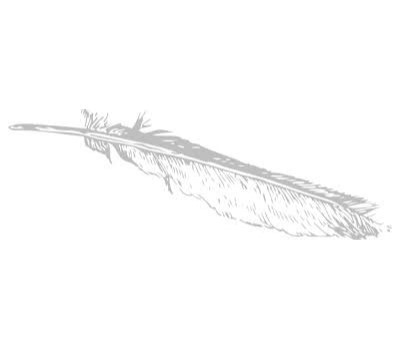
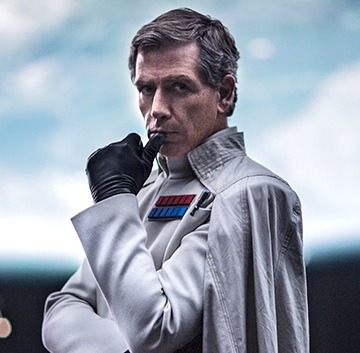
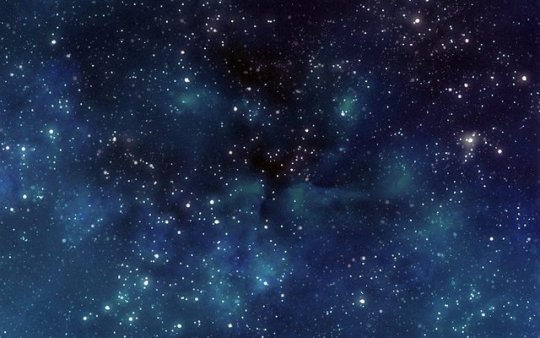
Scritches
Part I Part II Part III Part IV Part V
Summary: Even fearsome demonic beings need to enjoy a few simple pleasures in (after-)life. For Krennic, one of them is scritches. This part concludes the story (2867 words, sfw fluff with a sprinkling of angst light).
Characters: Angel!Krennic, Demon!Lyste, Grand Moff Tarkin, Demon Squad Anon
For some background, or simply more of the ‘charming’ Angel!Krennic, see imperialgradients’ Necroholocron!AU masterpost
Huge thanks and much love to @imperialgradients and @nspamc for letting me play with their OCs. I’ve had so much fun with them, and even if this is the final instalment of this story, I can’t promise I’ll be able to leave them alone in the future 😊
Strangely enough, Krennic wasn’t hungover the following morning, and, furthermore, appeared content to find you sitting beside him. He graciously accepted to be scratched both between his wings and under his chin. After a while, he even crept closer and laid his head in your lap.
“Thank you for allowing me to share your quarters tonight, sir.”
“This arrangement is most convenient,” he admitted with a superior drawl. “I had excellent foresight in commanding you here, although I do not recall extending quite such an intimate invitation.” He waved a clawed hand towards the bed, you, himself.
“You told me to help you undress, and I was going to leave, but Lyste ordered me to sleep here.”
“The imp issued you an order?” His wings twitched and he raised an astonished eyebrow.
“He technically outranks me, sir. And he knew I had nowhere else to stay.”
“I enjoyed having an escort; it is befitting of my station. You will continue to accompany me today.” He took your wrist and put your hand back beneath his chin for more scritches. “The present arrangement will continue as well. I am growing accustomed to a certain level of service and thus, I hereby command you to occupy this bed as a nightly occurrence.”
“Of course, sir. I will do my best to be useful.”
You couldn’t help staring as the director got out of bed; he was such a curious blend of greying soft-bellied middle age and otherworldly being. His feet, especially, caught your attention. How could they not, claws rattling against the floor with every step? And, apparently, even demons had knobbly knees.
Soon enough he was back fully dressed, stylish as ever with his cape and shiny, black boots, while you were still struggling to smooth out the creases in your tunic. Why had you let Lyste sleep on it? That question was easy to answer when the small demon peeked out from behind Krennic, flashed you a grin and looked at you with his eyes of bottomless black. You smiled back at the adorable imp, then flinched at the harsh command issued by the larger demon.
“Present arms!”
With no other weaponry at hand than the broom, you grabbed that. Krennic eyed you critically, pinning you with his gaze until you squirmed. Then, suddenly, there was a crack in his resolve, just a hint of one corner of his mouth being tugged upwards, and the next second he was laughing loud.
“A perfect little soldier, have you seen, Lyste?” The imp straightened his back and saluted him.
“I’m trying my best, sir.”
He shook his head. “No. This looks ridiculous. You will ruin my image completely – how can the populace perceive my sovereignty when being visually attacked by such a disgrace?” He tilted his head pensively and pouted. Then he grabbed the broom and broke the stick; it snapped like a twig in his hands.
“There. Better.” He flung the broken wood into a corner. “Now, follow me.”
“Of – of course, sir.” His strength simply baffled you.
Apparently, Director Krennic could be incredibly efficient when he put his mind to it. He read reports and issued orders with astonishing speed, presided at meetings and provided comments to drawings and plans, even lectured you on the lesser-known features of the station, eyes aglow with enthusiasm.
At meal-times he reverted to demonic habits, diving into rare steaks with sharp fangs and a voracious appetite. And then, there were the naps. Without warning, he would crash to the floor and fall asleep, impossible to wake by any means. Often it didn’t matter, but now, the Grand Moff himself would inspect this section and it simply wouldn’t do to have a great white lump lying on the floor just in front of the weapons controls.
“Get him away from here,” hissed the captain in charge.
“I’m trying, I’m trying.” Crouching by the demon’s side, you gently scratched his neck feathers.
“Wake up, please, sir…” You tried scratching a little harder, but it just made him sigh contentedly. You gave a slight tug, just at the end feathers, and a single beat of his wings sent you tumbling over.
“He’s coming now,” the captain announced icily.
Desperately, you put your lips close to the director’s ear and whispered. “Tarkin!” The man twitched in his sleep and you repeated it. “Tarkin is coming, you have to get up, please, get up or he’ll have Lord Vader strangle us both!”
He opened one eye superciliously, and then, as you mimed “Tarkin”, he flew to his feet in a spectacularly undignified manner. He looked around quickly, then strode off with his nose in the air and neck wings proudly spread.
“Ensign!” he admonished. “Are you neglecting your duties? Count yourself lucky for having such a forgiving and understanding mentor as myself.”
Days turned into weeks and you settled in well in the Krennic’s undecorated but very dusty set of rooms. Any attempt to clean was met with immediate disapproval.
“Cleaning droids? How dare you imply that I would accept such artificial service?”
“I could do it myself, then.”
“Do you consider yourself worthy of touching my divine abode?”
He was being ridiculous, but it was clearly a touchy subject and not one you cared to argue with him about. With the director’s recent bursts of energy and fondness for napping anywhere else, it was not like you spent a lot of time in there anyway,
When you did, it was usually in bed.
One evening you were lying on your side, turned away from him and drifting into sleep in the best way possible. A strong arm rested heavily over your torso, holding you close as he leaned his cheek against your shoulder, his hot breath caressing your skin. You felt him nuzzle the nape of your neck affectionately, shivers of pleasure went down your spine, and then you suddenly squeaked pitifully, going tense.
“You are no longer content,” he remarked. “You ought to be, considering the attention being bestowed upon your inferior body.”
“Sorry. Unworthy as I may be, I enjoy this a lot. Just be careful with those fangs, please.”
“You still fear me.” His contented chuckle made you smile. At times like this, it was so easy to forget that he was demon. The reminders were annoying, but very necessary. You must never trust him completely.
“I do.” You lifted your arm and ran your hand along a scaly finger down to the sharp end of a claw.
“You are not expendable.” His teeth were at your neck again, dragging gently over the skin, over and over again until you were finally able to relax.
There are feathers everywhere. It’s the middle of the night and you should be asleep but instead there’s chaos, you’re tangled in sheets and blankets and his goddamned cape that he insists sleeping with. Its familiar fragrance ought to be calming, but now it just adds to the feeling of being smothered in softness. There’s motion, too, an odd gust of wind that sends your hair flying, getting it into your eyes. You can’t see a thing but there’s a distinct impression of wings. Too many of them, and too large. Can’t he just go back to sleep!
You reach out – a downy shoulder against your palm, heaving. It stills and you edge your fingers closer to his neck. There. Just a few scritches and you can both go back to sleep. He stills, and there’s a soft sigh, but then feathers – wings – beat against your face, and you can’t reach around them, your arms are too short. There’s more flapping and the mattress shakes and the entire room seems filled with strange beings that you can’t see but you know they are there. There is growling and sniffing and shuffling of feet. A whirlwind of blankets and sheets around you and you shy away, press against the comparative safety of the headboard. It’s shaking too, the racket enough to wake the dead. The wall is solid against your hand, and then it’s not, and you can’t breathe –
Breathe. In. Out. The air is fresh. Stillness around. You open your eyes and for a moment there’s grey blur where the room should be, but then, clarity. The huge viewport calls to you, beckons you closer. Nothing there, only space. Sleep, that is what you need. And yet, your feet move towards the viewport. As you look to the right, there’s movement just outside your field of vision. Great wings beating majestically, bearing their owner closer, allowing you to admire it as it flies past. Some kind of alien bird, no, a – a man. It’s him and, at the same time, it’s not. This glorious being of wings and faces – too many of all of them and yet they seem to fit him – is Krennic. The rude, arrogant drunkard of a demon! The metamorphosis is unfathomable and yet it is a fact.
He doesn’t deign a glance at you. You wish with all your heart that he would look at you, see you, even just to acknowledge your existence. There is nothing, although you stand staring, hoping until he is just a tiny speckle of light, one star among many.
You awoke to the insistent beeping of the datapad in the main room, left there in the hope that Krennic wouldn’t wake you if he decided to get up and play games at some ghastly hour. You often woke up earlier than you needed to, but with that weird dream it was no wonder you had overslept. Staggering into the other room, you barely noticed your surroundings, but once the cursed piece of technology was silenced, you began to take in the state of the bedroom. The bed was a mess, empty but for your pillow. All the bedding was strewn across the floor, pushed up against the walls as if some giant tornado had passed through.
As you began to put things back where they belonged, you got a distinct feeling of emptiness that went further than the expanse of the demonic director’s quarters. Something moving underneath the bed made you jump, but an inquisitive whimper put you at ease.
“Lyste? Is that you?”
A dark hand with a perfect set of claws became visible, and soon the small demon crept out of there. He looked distinctly unhappy, in spite of holding his trademark slipper, hurt and a little confused.
“Come here?” You sat down on the bed and patted the mattress beside you. Lyste inclined his head and then came to sit beside you, and somehow you just knew what was the matter.
“He has left us, hasn’t he?” Black pits blinked. “He’s gone.” A whimper, and then the imp bumped his forehead against your arm. You put it around him and began to stroke his head as you tried to sort out your emotions. Hurt. Betrayal. Sadness. Anger – no, not that. You couldn’t be angry with Krennic now any more than you could when he was near. Yours was a weird kind of friendship, but it had been that. If one could be friends with a demon.
Lyste’s insistent head bumping interrupted your thoughts. One look at him was enough to understand why. “Sorry. I know. I still have you.” You gave him a brief hug, careful not to startle him, and then he bowed his head. “You like scritches, too.” For Lyste, it was the base of his horns that itched and you spent a long time scratching him, long enough even that the first sharp pain in your chest began to pass. Director Krennic had left and there was nothing you could do about it.
“You will leave, too,” you told Lyste, who was now smiling and showing off his tiny, sharp fangs. “Your Eli will come for you soon.” He smiled even broader, then opened his eyes and ran his tail gently along your arm. “I – I will move on also. I just need a little time. But I will remember you, and him. I will look at the stars and know that you are there, somewhere. It will be painful at first, like now, but then there will only be good memories.”
Something caught Lyste’s attention and he rose swiftly, scurrying away out the door. You returned to the previous chores, and when the bedroom looked reasonably orderly, you went to dress. As you opened the wardrobe with your things, the only one you were allowed to touch, you immediately saw it – a single white feather lying on top of your tunic. It wasn’t a downy thing like those Krennic frequently spread about when he was moulting, but an elegant, yet strong, quill. Furthermore, it was almost twice as long as any of the feathers on his neck wings had been. Reverently, you took it between your hands and sensed a whiff of cologne at the same time as black smoke whirled in front of your eyes, only to be devoured by sharp light. The feather wafted out of your hands and for a moment you thought you had dreamt it, but when you looked, it lay there again.
Afraid to lose it, you kept your eyes trained at the feather as you dressed, and when you were done, you stuck it inside the side pocket where your code cylinder would go if you ever turned important enough to have one. This seemed the more unlikely to happen as you would now have to report to your superiors of your catastrophic failure in keeping an eye on the Grand Moff’s demon.
The great man was in his office, and chose to admit you at once, almost as if he had expected you.
“I’m sorry, sir. I – I can’t explain it, but he’s gone. I – I lost him!” Shame washed over you in unmerciful waves and you hung your head, unable to look at Tarkin.
The Grand Moff was silent for a while, then uttered dryly: “Escaped, is more like it.”
You lifted your head, surprised. “I should have tried to stop him!”
Tarkin eyed you calmly. “Tell me, Ensign, would you have had a chance of succeeding?”
“No, sir. But I should have tried. I was asleep. I’m sorry!”
“He was released. Good riddance, I say.” You stared at him. “Director Krennic’s usefulness here had come to an end,” he continued. “His presence, in any state or form, is no longer required. This station is now fully operational.” He emanated pride and satisfaction.
“Congratulations, sir.”
“Thank – what is that?” He stretched out a hand towards you but stopped short of touching the feather; instead, he slowly retracted his fingers.
“I’m not sure, sir, but I think it comes from him.”
His eyes widened and he pursed his lips, then said: “You may keep it, in private. I don’t need a constant reminder of my failure.”
“Sorry, sir.”
“Go, now. You can keep his quarters too. I know you’ve been staying there. Nobody else wants to go near those rooms. That entire section is cursed.”
“Cursed, sir?”
“Cursed! That wretched creature has done more damage than service to the Empire.”
Back in your home, you set to cleaning. Lyste’s presence slowed down the process, but his playfulness lifted your mood. The amount of dust on every horizontal surface was just astounding. The feather found its place on the narrow shelf opposite the bed, and while cleaning, you also discovered a portrait that fit the empty hook on the wall above it. It was a bit weird that someone would decorate their bedroom with an enormous portrait of themselves, but somehow that seemed to catch the essence of the handsome director.
“He’s insufferable, but we like him anyway, don’t we?” Lyste purred.
There were more surprising treasures to be found in cupboards and drawers, nothing neatly stowed, everything crammed in as if in a sudden fit to get rid of it all. Clothes, of course, among them an astonishing number of socks with pierced toes. A ring with the insignia of the engineering corps. A set of ancient-looking instruments, presumably for drawings. More clothes. The impressive DT-29 the director had claimed not to know the whereabouts of – that would have to be turned in to your superiors, later. And, perhaps the most surprising find of all – two full wine bottles, in addition to the numerous empty ones.
Work well done, you opened one of the bottles and poured yourself a glass. You draped Director Krennic’s cape around your shoulders and sat down in a comfortable chair by the viewport, from where you could both see the portrait and look outside. The soft fabric was so slinky it kept slipping through your fingers, but it still carried his scent. You lifted your glass towards the portrait and looked deep into his eyes. Cheers, Director. The once bitter taste of rich red was almost sweet on your tongue. Cradling the glass in shaky hands, you turned towards the stars again and soon had to wipe your eyes to be able see through the haze. Gone. Another sip, and fond memories flooded your mind, making you smile through tears. He is free now.
THE END
8 notes
·
View notes
Text
Maiden, Mother, Crone: “The Battle for Mewni” and the triple goddess -- the agony of birth, the trial of motherhood, and the hard price of power.
Ah, at last!
Here we are at the other side of Star vs. the Forces of Evil's "The Battle for Mewni." Was it everything I thought it would be? Yes, I think so; it was even more than that. There's a lot to unpack in these episodes, and I plan to take my time in doing so. (But not too much time.)
This post will discuss Star, Moon, and Eclipsa and the connection they all have to a mythological concept called the triple goddess, with each of these characters representing one of the three archetypical aspects of the goddess -- Maiden, Mother, Crone. I will discuss the nature of each aspect, while touching upon the comparisons and contrasts we are meant to perceive by way of these analogues, and I will explain what I think the implications are of the triple goddess's presence.
This will be a long post.
First, Some Acknowledgements
This post owes a nod to my good friend @malthuswibble, whose post on reddit regarding possible symbolism and mythology behind the cauldron is probably more precise and insightful than anything I will ever post, and to reddit user celestialwolf157, who wrote an extensive analysis on Queen Moon which illustrates her shortcomings as a leader. My analysis will touch on some of the same ideas from these two essays, and I would strongly encourage you to not only read these posts but follow their writers as well.
Though it might sometimes feel like a solitary activity, critical analysis, whether literary or not, is a community effort. One writes critical analysis so that others will read it and discover something new, and, as a literary critic, one is inspired by both the work in question -- Star vs. the Forces of Evil, in this case -- and by what other people have to say about it -- that is, the Star community and their often-thoughtful observations. Just as I read your posts and take something valuable from them, it is my hope that you will read my posts and find something worthwhile in them for yourself. In this way -- together -- we can create new meaning. Thank you for this opportunity!
With this in mind, allow me to present something which has taken far too long to reach you.
The Triple Goddess
Simply put, the triple goddess is the idea that there is a set of goddesses, each representing three allegedly prototypical aspects of womanhood or three spheres of influence. Whether there is a genuine basis for the triple goddess in historical mythology is something best left to be settled by scholars more talented than I am and is, in fact, irrelevant for the purposes of this discussion; as a literary concept that writers regularly make use of, whether in earnest or in parody, the triple goddess has proven to be useful.
There are, of course, some historical examples of tripartite goddesses -- colloquially called "triple goddesses" -- many of which have made their way into not only modern paganism but also popular fiction:
Greek goddesses (The Fates, the Furies, Hecate)
Norse goddesses (The Norns)
Irish goddesses (The Morrigan)
But I would argue instead that instead of a literal mythological analogue, Star, Moon, and Eclipsa instead fit the syncretic and modern-pagan idea of triple goddess: three women, each one at a different stage of her life. Yet there is some confusion and complexity in their roles, with Eclipsa, whom we know the least about, presenting the greatest uncertainty.
An ordinary reading of the triple goddess in "The Battle for Mewni" might place the characters thus:
Star, being a young woman, is the Maiden, who symbolizes the beginning as well as innocence, potential, and youth.
Moon, being Star's mother and motherly in general, is the Mother, who symbolizes the middle as well as experience, fertility, and vitality.
Eclipsa, given her advanced age and (forbidden) knowledge, is the Crone, who symbolizes the end as well as wisdom, exhaustion, and death.
And that's a fine reading that neatly ties everything together. However, I believe that, like so many other things in Star vs. the Forces of Evil, this seemingly-obvious established order has actually been turned on its head; there is more going on under the surface than there appears to be at first glance. To discover that, we can make use of the concept of the triple goddess to examine the ways in which these three characters don't fit their molds -- and, from that comparison, discern what the series is trying to tell us.
Let's start with Star.
The Agony of Birth
A caveat before we begin: I am not a woman; I am a man, and to be quite frank, I don't feel that I am qualified in the slightest to write about the pain of childbirth (or indeed any of the experiences of motherhood). When I write about these things, I must go by what the women in my life have told me, or what I have seen myself or read from others. With that admission -- because it seems clear to me that "The Battle for Mewni," at least in part, is about childbirth and the challenge of raising children, in addition to the difficulties women face as they transition into new stages of life -- I will nevertheless endeavor to navigate this maze as best I can.
The Maiden, as I mentioned earlier, symbolizes the beginning of a woman's life. And while Star certainly is still youthful, energetic, and reckless, the princess has undoubtedly tempered herself from the marauding ball of energy she was in "Star Comes to Earth," the very first episode of the series, has she not? She has matured and will continue to mature further.
Ultimately, I think, Star vs. the Forces of Evil is about Star becoming a woman, if not a queen. Like the magical girl shows that it was inspired by, Star vs. the Forces of Evil uses the magical girl transformation -- bound together with the literal butterfly's metamorphosis, a conceit unique to the series -- as a metaphor for the transition from girlhood to womanhood. "The Battle for Mewni" has, in addition to clear examples of her change, potent symbolism underscoring the nature of the transition.
In "Return to Mewni," we have clear evidence that Star is separating from her parents and becoming her own woman:

Star does things differently from Moon at every turn, often to the latter's chagrin.
This theme of children struggling against their parents is further reinforced in "Puddle Defender" when both Moon and Buff Frog prevent Star from sneaking off on her own; Star does so anyway.

Star knew that her mother was too weak, both magically and in terms of will, to do what was necessary, so she decided to bear the burden herself -- to sacrifice herself in order to restore magic.
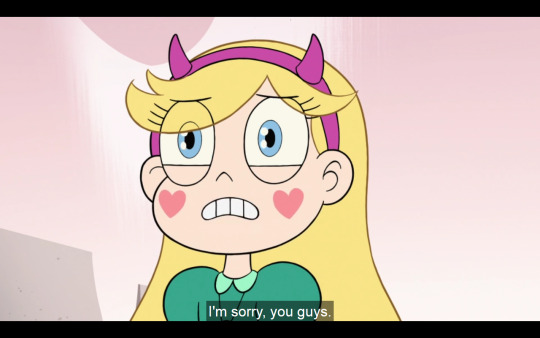

That is an absurdly heavy burden for a child to bear. That Star determines -- on her own -- that it is a burden she alone must bear is a clear indication of her maturity, the contrast between Star and her mother made all the more stark by Star's choice.
It is in this otherworldly realm that the episode "Toffee" presents a startling and extraordinarily powerful metaphor:

The cauldron is an ancient symbol of femininity; more specifically, it is a symbol of the womb. (You may recall me briefly touching upon this topic in my post about the Holy Grail in Star vs. the Forces of Evil.)
That Star draws from it an egg -- both a figurative egg and literal egg with a literal fetus inside of it, as she is screaming in agony the entire time -- is simply astonishing to me. This entire scene is an incredible metaphor for childbirth.

I once said that the writers of Star vs. the Forces of Evil have a stunning command of visual metaphor. This moment with Star and the cauldron far surpasses anything yet seen in the show. It is, far and away, one of the most potent pieces of figurative storytelling in modern animation.
Too, this scene hearkens back to something @kyotosummer wrote in her (not-enough-attended-to) posts on connections between Sailor Moon and Star vs. the Forces of Evil: the Galaxy Cauldron.
Star reaching into the cauldron makes the connection I was missing between universe, cauldron, and egg. (I believe it's significant, too, that the egg is made from pudding -- but that's a topic I shall cover in another post.)
It's this scene, therefore, that firmly establishes Star not as a mere Maiden but as a young girl on the cusp of womanhood, one who is cognizant of her potential for bringing new life into the world and of the sacrifice that womanhood often requires.
Indeed, I answered a question not too long ago in which I remarked on the significance of the term "light-bearer": for, as we can clearly see from both the opening of the show, some of the episode posters, and the closing credits, Star is intended to be the single light remaining in a world of darkness: the light-bearer, the one who carries the light.
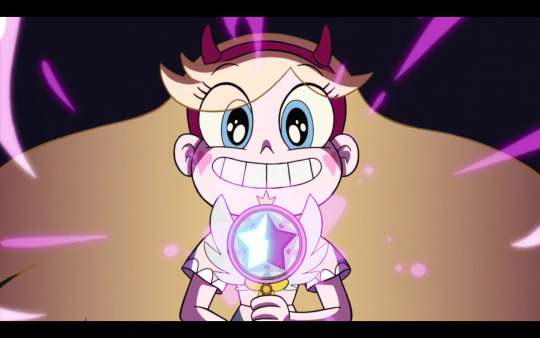
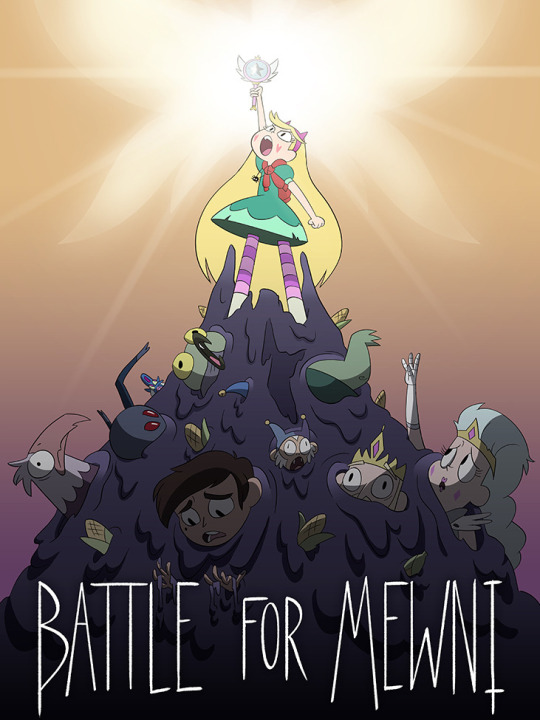
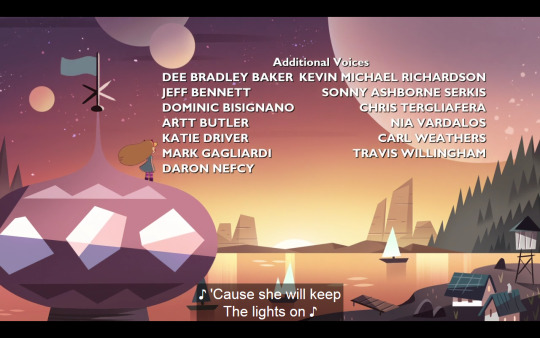
Crucially, bear can also mean "give birth to" -- and the cauldron scene makes it clear that it's both of these senses which are meant. Star gives birth to and carries the light.
I wonder: do young women, watching "The Battle of Mewni" -- do these scenes speak to them and make them more aware of the transformations that lie ahead for them, just as Star undergoes transformations in her own life? Does this show help them realize the capacity of birthing not only literal new life but also entire fictional universes -- universes that feel just as palpably real as one's own heartbeat?
After all, isn't Star herself the product of someone who gave birth to her in our own world -- that is, Daron Nefcy?
I wonder.
Yet even as Star wrestles with the fact that she is transitioning into a woman, her own mother, Queen Moon, has separate struggles: the challenges of being a queen, of being a wife, and of being a mother. In all three areas, she unfortunately comes up short. In this next section, I will discuss how Queen Moon falls short of the archetype of the Mother.
The Trial of Motherhood
In "Return to Mewni" and "Puddle Defender," we can plainly see that Moon's actions are informed by one single goal: keeping her daughter safe. But despite the fact that she obviously cares for Star, Moon clearly does not understand her daughter at all:
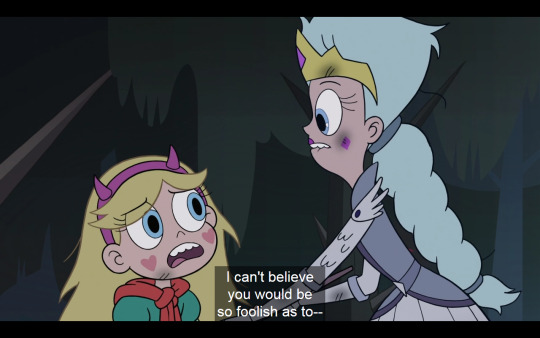
Star lacks Moon's cautiousness, and Moon is unwilling to accept the reality that her daughter is a different person from her -- something she remains blind to until the very end. Only Glossaryck understands Star's true nature (and indeed prepares accordingly). This comes up prior to "The Battle for Mewni"; recall Glossaryck's conversation with Moon in "Page Turner":
Moon: Why all the riddles? You were always very direct when you were training me.
Glossaryck: (sighs) Well, it finally happened. Every queen wants to tell me how to do my job. "My training was different." You know what Glossaryck hears? "Me, me, me, me, me! I'm going to pull my mentor away from his job so I can be in the spotlight again." The only Butterfly to leave me be was your great-great-great-great-great-great-great-grandmother, Eclipsa, the Queen of Darkness -- whose chapter, coincidentally, you left Star alone with when you pulled me into this wonderland of red tape.
[...]
Glossaryck: You all did this because you don't trust me, and what's worse, you don't trust Star. My queen. My queen, your training was different because Star is different. You have to have faith in her to make choices that are best for her. And my job is to train Star to be a queen.

But by the time "The Battle for Mewni" comes around, it seems Moon has forgotten Glossaryck's words to her; instead of helping Star, she's still trying to control what Star says, thinks, and does. In the earlier example in "Return to Mewni," Star's instincts to fight Ludo's rats in combat could have worked to the pair's favor if, instead of focusing on scolding Star, Moon had joined her in dispensing with the rats. But by turning her attention on Star and what she allegedly did wrong, Moon inadvertently gives the rats the opening they need to sabotage their journey.

Star's impulse to openly challenge her enemies is constantly at war with Moon's drive to preserve the status quo through stealth and subterfuge. Ultimately, Star's philosophy is proven right when she restores magic and defeats Toffee -- something that Moon would never have accomplished simply by hiding and waiting.
And there's the other matter: Moon simply isn't strong enough. In "Baby," we learn that Star's power far exceeds her mother’s -- and in fact potentially rivals Queen Eclipsa's:

Star herself even points out Moon's weakness during their heated argument in "Return to Mewni":

By the end of "Toffee," the titular villain has laid bare the true extent of Moon's desperation and exhaustion: she is willing to sacrifice even the one thing that defined her as queen -- Toffee's finger -- in order to get her daughter back, and is utterly helpless when Toffee betrays her.

The crushing despair of this final twist of the knife is what causes Moon to finally break down.

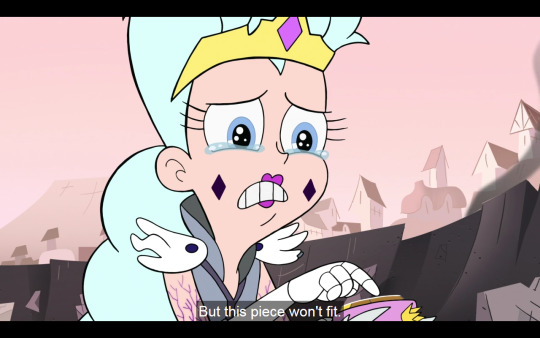
I think we have not yet seen the full extent of the torture that Moon will be put through (but this is a pet theory of mine that I've been working on which I will write more in-depth about another day). Suffice it to say that, at the end of "The Battle for Mewni," Moon has lost her validity as a queen, as a wife, and as a parent. She is utterly exhausted and powerless in the face of evil to protect those she loves, which forces her daughter to sacrifice her own life in order to restore magic. It's truly every parent's worst nightmare, and it's pretty grim stuff.
In this way, then -- referring back to the triple goddess -- Moon more resembles the Crone than the Mother: she is "old and gray," exhausted and weak. Worse still, it's not clear by the end whether or not she is any wiser for the experience. If anything, she seems brittle -- almost unhinged, really -- as evinced by the nervous little laugh she gives at the end of "Toffee":

Moon does the best she can using the tools at her disposal, but I think the sad truth is that, due to her mother's early death and the pressures put upon her as queen, she never got a chance to grow up and become a confident, full-fledged woman -- very much unlike Eclipsa, who exudes confidence and independence, and whose mother was also allegedly killed at a young age.
Interestingly, while previously Star has been compared to Eclipsa (see "Baby" again), "The Battle for Mewni" compares Moon to Eclipsa, and it's this comparison which intrigues me, since we otherwise know so little about the Queen of Darkness; perhaps the comparison hints at something to come.
The Hard Price of Power
Before we discuss Eclipsa's comparison of herself to Moon, we should establish what we know about Eclipsa.
We have heard bits and pieces of legends about her throughout the series, starting as far back as "Into the Wand" in the second season, but we still know very little actual fact about her life. Her tapestry claims that she abandoned her Mewman husband for a monster lover, but "Moon the Undaunted" reveals that the tapestries are little more than creative retellings of history (i.e., propaganda -- now there's a timely subject), so it's unclear just how true that is.
Eclipsa also reveals some things to Moon in "Moon the Undaunted," but I think it would be prudent to be skeptical of these claims until we actually see them for ourselves. The only factual things that we know is that Eclipsa is a powerful spellcaster who wrote a chapter in the Book of Spells which is kept under lock and key; that Rhombulus freezes Eclipsa in crystal because, so he claims, she is evil; and that Eclipsa was originally born hundreds of years ago and is a distant ancestor to Star and Moon.
From her sinister appearance, the stories about her, and the fact that she is family, I would say there is more than a little bit of Morgan le Fay in Eclipsa -- a nod to the Arthurian legends that seem to be a running thread throughout Star vs. the Forces of Evil.
It's clear, also, from "Into the Wand" and from Glossaryck's conversation with Moon in "Page Turner" (mentioned in the previous section) that Eclipsa values her independence and freedom. Yet those boons and the power needed to enforce them -- interpreted (rightly or wrongly) by Rhombulus as evil -- come with a high price; I can think of nothing worse for someone so independent-minded than being imprisoned alone and totally constricted for literally hundreds of years.
Moon, too, pays a high price for the power to defeat Toffee by making a dangerous agreement with Eclipsa; she is aware of the risks of freeing Eclipsa and so intentionally misses her shot with the Darkest Spell in order to merely destroy Toffee's credibility (and thus rout his army). Yet this power fails to truly defeat Toffee, allowing him to return and exact revenge on her. By the end of "The Battle of Mewni," she is utterly powerless, and it seems inevitable that Eclipsa will be freed.
It's hard for me not to feel pity for Moon; like Star, she, too, has an enormous burden foisted upon her at a young age. She is scared and desperate at the lowest point of her life in the wake of her mother's slaying. With nowhere else to turn, she approaches Eclipsa for help.

Interestingly, upon speaking with Moon, Eclipsa almost immediately compares the two of them:
Eclipsa: (tearing up) I lost my mother, too, when I was not much older than you.
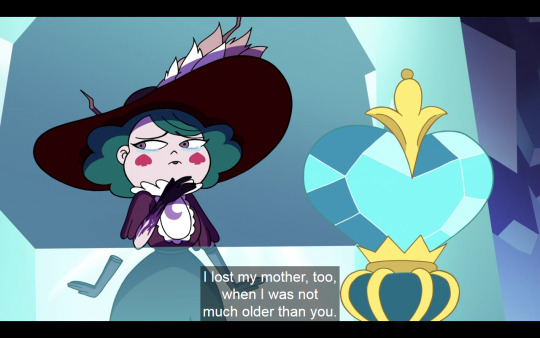
What are we to make of this comparison? I am uncertain. We know so little about Eclipsa that it's hard for me to say what role she will come to play. Can we even trust what Eclipsa says? Does she seem genuine?
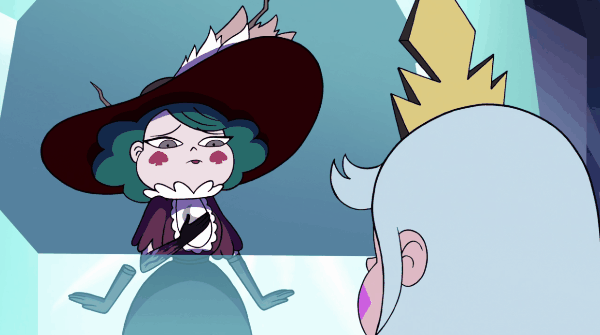
Despite her formidable abilities and her extensive contribution to the Book of Spells, Eclipsa still looks quite young -- nothing like the Crone one might think of when imagining an ancient witch. (For, indeed, Eclipsa is ancient compared to Moon and Star, having been "alive" for over three hundred years.) Certainly, she appears to be younger in appearance than Moon.
I suspect this relative age is the key to understanding Eclipsa's coming role. I have often (half-seriously) called Eclipsa "Evil Mary Poppins," thanks to her umbrella and her garb, but there's a strong possibility that Eclipsa will be a sort of alternate mother for Star -- a replacement for the tired, old Moon who doesn't even really get Star anyway -- that is, someone who understands why Star detests the traditions of Mewni, who sympathizes with Star's love for Marco, who shows Star another path to becoming queen, one that will no doubt be sorely tempting, as Star herself, like Eclipsa, is fiercely independent.
It's not hard to see how this scenario might play out.
In the coming season, Star herself will likely face the same quandary that Moon does in "The Battle for Mewni": what cost will Star be willing to pay for the power to save her kingdom? Her family? Her love? Would she sacrifice all that for freedom? We shall no doubt see.
A Useful Reading?
Earlier, I introduced a simple reading of the triple goddess in "The Battle for Mewni": Star as the Maiden, Moon as the Mother, and Eclipsa as the Crone. The series definitely wants us to recognize the relationships that these three women have between each other, as well as what it means to be a daughter, a mother, and a queen. Yet I think the series wants us to understand that life is a process of change, continual change, and that none of these women are confined to (or defined by) any of these roles. They are in flux: Star is discovering her potential for new life; Moon, alas, is in decline, both physically and mentally; and Eclipsa will be once more free again to exert her influence.
While the triple goddess unfairly limits women to three particular roles, I think it’s still useful as a concept for thinking about depictions of womanhood in fiction (and whether they are fair or unfair) -- and, in this particular case, is useful for examining the extent to which the lives of Mewni will be unexpectedly thrown into confusion by Eclipsa's release. There is disorder everywhere -- that will be particularly evident once two queens of Mewni concurrently walk the realm, competing with one another. That theme of disorder, I predict, will grow and grow as the season progresses. Star vs. the Forces of Evil will evoke a deep sense of unease -- even dread.
It is therefore fitting that Star, who herself embodies the messy disorganization of ordinary life and is practically the champion of chaos, will be the one who must put things to rights. It will be another chapter in her story of development.
Future Writing
I hope you enjoyed reading this analysis of "The Battle for Mewni." It's been a long time coming. The next analysis and theory posts will not take nearly as long (let us hope). I want to talk a little bit about what's going to come next. I have a lot to cover, and I'd like to write it all before the new episodes come out in November. Here's a rough order of the posts to come:
Vaylon’s Crazy Theory on Pony Head.
Vaylon’s Crazy Theory on Queen Moon.
Unsolved mysteries of Star vs. the Forces of Evil.
A Double Take on “Pixtopia,” loneliness, and wabi-sabi.
A Double Take on "Fetch" and mistaken identity.
More analysis about "The Battle for Mewni."
Glossaryck's true nature and goals.
Star's facility for lyric composition and its relation to her imaginative spellcasting.
The Holy Grail theory, revisited.
How much influence does Revolutionary Girl Utena have in Star vs. the Forces of Evil?
And, of course -- because this is a blog about animation in general -- I'd like to write a bit about some unrelated animated series, including The Real Ghostbusters, BoJack Horseman, and Neon Genesis Evangelion.
As you can see, I have my work cut out for me. Feel free to send me any questions you may have or message me with your preferences as to my topics or with suggestions for things you'd like to see. Thank you for reading! See you again soon.
#star vs the forces of evil#the battle for mewni#analysis#star butterfly#moon butterfly#eclipsa#triple goddess
34 notes
·
View notes
Text
♡‘Post - it’ - Workshop
25 / 03 / 2020
Equipment:
Post it notes
Black 0.3 and 0.2 fine liner
Blue highlighter
Watercolour
Watercolour brush
The aims of this session was to make panelled illustrations based on observation and ideas based on general ideas and sketching. We also were to create at least 6 drawn and inked post it note panels, each one based on a different subject. Then, using these we had to build a non-sequential comic using these panels. Then we were to make a group comic using yours and somebody else’s post it notes. This was to help us think about how we make sense of the world and put non-sequential images together to make sense. When creating our panels, it’s important to keep thinking back to the Gestalt Theory, making sure we are showing an appropriate response.
Comic Definition:
Juxtaposed pictorial and other images in deliberate sequence, intended to convey information and/or to produce an aesthetic response in the viewer.
So what is the Gestalt Theory?
‘Gestalt’ is a psychological term that means ‘unified whole’ and it refers to the way we see or perceive things. This theory was formed by German psychologists in the late 1920′s. It’s based around the idea that everything we look at, we put into groups or unified according to their similarity or shape. For example, when I look at the picture below, specifically at Closure, I see the triangle the most, even though the shape isn’t really there. The black dots and the cuts in them are creating an illusion with the negative space and turning it into a closed off, simple triangle. This is the way that our brains fill in the blanks for us when things don’t seem to make sense upon first glance.

Back to the task, our first instruction was to react and sketch based on visual prompts. We were encouraged to use our imaginations, but don’t take something completely out of the blue. I wanted to make sure that I had a reason behind every post it note drawing and I will talk about that here. I began looking at the bullet point list that our tutor had given us and sketched ideas that first came to my mind. Amidst the corona virus situation, I went out for a walk and took pictures of daffodils I noticed growing around the place. I planned to incorporate them into my work somehow. Tis workshop felt like a good opportunity. After sketching out the daffodil I decided to give it an emotion to make it weird and wonderful. Almost surreal!
The list we were given were:
Objects & tools
Icons of Inspiration
Characters & Alter egos
Motivational words & Wisdom
Emotions & Expressions
Weird & Wonderful
The motivational words I didn’t think too hard about. ‘You’ve got this’ came to my mind straight away and I stuck with it.


The first drawing I did was of the view I see from my window. Although it didn’t fit into the bullet point list we were given, it was still different enough to the rest that I thought it would work anyway. After that I worked on ‘you got this’, for the motivational words bullet point. Those words came to my mind immediately. They’re like a quick believe in yourself motivation that I find really helpful for when you feel disheartened about something. The next one was referenced from daffodils I saw on my walk the other day. I took a picture of them because I thought they were really pretty. I decided to put it under the category of weird and wonderful, so I attempted a surreal idea of giving it can expression. With this, I chose to juxtapose the daffodil’s positive connotation of spring and sunshine with something dark with heavy eye-liner. I think this contrast worked well and I am pleased with the result.
For the inspirations, I spent a while trying to think of how to incorporate people I look up to into a small drawing. So then I decided to go for a different approach and worked on the idea of inspiration connotating with admiration and then infatuation? This is what led me to draw the eye with the light bulb in the middle, staring in amazement at the viewer but then tears of petals because they feel like they could never become someone like the person they’re admiring.
The paintbrush was the first thing that came to my mind under tools. Then the last one was the one I spent most time on, inspired by the mix of alter ego and expressions. I have a personal own character who deals with two identities. One where he’ s transformed into this inky vigilante and the other being a lonely guy with no friends other than Steve, the parasite-like monster that’s obsessed with ice cream and making Cipper’s like miserable. I won’t get into them too much, just enough to give some context. I wanted to create something really deep and I first started with a sketch of a sad expression, but in the end I went a bit further. Although drowning isn’t an emotion, I drew a desperate expression of terror. I wanted to make him look uncomfortable being smothered and doesn’t look like he can quite handle it.
As someone who doesn’t usually draw quite dramatically dark stuff, this was new for me. But I enjoyed it and liked the outcome.
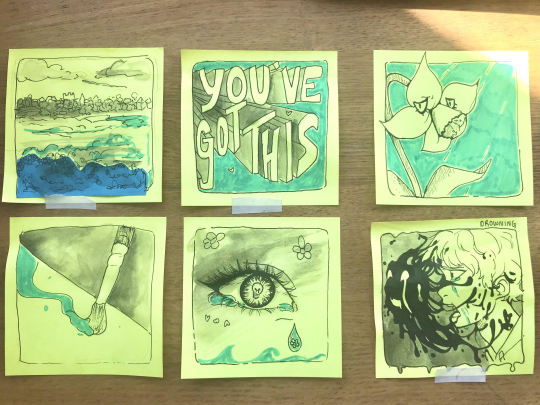
After that, our next task was to put them together and rearrange them into a sequence, then try to make sense of them. Here is my arrangement:

From where my mind tries to fill in the blanks, I interpret it this way. “You’ve got this” they said, but does she? Her tears were welling up quickly, grieving tears spilling over her cheeks as she mourned for the person she knew she could ever become. It was enough to form rivers, her tears suddenly pouring into the world and creating oceans in their wake. As the tears touched nature, flowers took their first breath of life. But from the deep of the ground came the monsters the tears had awoken. Hungry for more, they sought out the helpless to greedily feast on their worst nightmares.
I don’t know when my interpretations started becoming so dark but I promise quarantine isn’t making me crazy.
Group Sequence:

Despite that all the panels are so different, does it work as a comic? I think it does! To me, my interpretation of this is a struggle in seeing the positive side of things. Like an enthusiasm for something it great, but it’s only temporary. I think it’s possible to also interpret this as in someone is trying to make a change in their life but can’t. The eye with the heart in the beginning being a sudden love for something (in this instance, smoking) and then there’s this sort of nothing-ness and suddenly everything revolves around the next cigarette. A friend comes along and gives support to get them out of the addiction. But they re-lapse. Then 2020 is a new year. Suddenly they’re even more determined to make the change.
What this has taught me:
In conclusion, I definitely understand the Gestalt Theory, as it makes sense that our brains will fill in the blanks for us where it seems that nothing makes sense. This makes me think about how humans like the genre of mystery and detective work. Filling in the blanks an solving things as a narrative has been a highly successful theme in entertainment. This theory is something I definitely want to look further into, because of my planned mystery narrative. This has also helped me when thinking about the way I could set out my comic (which is one of the final outcomes that I want.) I should infer some of the clues and panels here and there, not completely spell out what is happening to the viewer.
0 notes
Text
[request] [scenario] downpour

21: “We’re in the middle of a thunderstorm and you wanna stop and feel the rain?”
30: “It’s not what it looks like…”
(ur welcome!!!! ya’ll, i cried various times writing this. inspired by jihoon’s lyrics for ioi!!! enjoy)
Title: downpour
Member: jeonghan
Genre: angst - post-break up // good ending
Word Count: 1903
What exactly is ‘love’?
The definition varies for everyone, really; someone’s definition of ‘love’ could be a warm blanket and food, another’s a tub of ice cream and kitten cuddles.
Yours was…
Yoon Jeonghan.
He was sunshine and rainbows, the moon to your stars, the smile on your face.
Was.
He’s now the rain to your clouds, the tears strolling down your face and the headache that just won’t go away.
His legs are no longer tangled with yours, his eyes are no longer on you and his hand isn’t perfectly fitting in yours.
He’s a faint memory of heavy rain, thunderous clouds and wet footsteps.
You’re jolted out of your state of self-loathing by a clap of thunder, followed by a flash of lightning that illuminates the dimly lit library. You run a hand through your hair and let out a tired sigh, because the document in front of you remains blank, and there’s an X over the wifi connection.
“You can’t be serious, hyung - you’re studying when we could be, I don’t know, playing video games back at the house?”
“You’re kidding, right Gyu? Did you come to university to graduate, or be put on probation?”
The two voices begin to spit insults at each other, and it would be a lot more helpful if you were writing a paper on why boys were stupid, but you aren’t.
You shut your laptop, not like you were going to get anything done, anyway, because with the storm brewing outside, it's bringing back memories you shouldn’t remember.
You recognize the fraternity symbol embroidered onto the back of the arguing males’ backs, a diamond with cursive reading ‘SVT’ below it, and the lump in your throat grows larger, your heartbeat quicker.
You do your best to not draw attention as you fling your belongings into your backpack and jerk your laptop charger out of its outlet.
You’re almost home-free when you realize it’s pouring rain, and you’re umbrella-less.
“Hey, are you al- “ You turn at the voice, taking a few steps back from the male who unconsciously smiles, expression softening at your all-too familiar eyes and lips, breath hitching in his throat, struggling to finish his sentence, “-right… Are you… Um, gonna be okay out there?”
An ache settles into your chest when you meet his eyes, so you quickly avert them and turn away, towards the heavy wooden doors. “Yeah. I will.”
“You don’t sound too sure. Wait here, I’ll lend you my umbrella.”
He doesn’t wait for a response, and you can hear his footsteps grow quieter as he walks away.
You’re not going to let him do this for you, because you don’t need false hope to mend your aching heart, so you push the heavy door open, ignoring the call after you, and immediately walk out into the quad, rain drenching you from head to toe.
The heavy door that shut seconds before swings open again, wet footsteps ensuing.
“I know you hate me but it isn’t a reason for you to get sick.” You continue walking, not trusting yourself to reply, because it takes everything within you to refrain from crashing into his arms, sobbing.
You feel a warm hand around your wrist and you almost melt.
“Please, look at me. Don’t be like this. It’s about your health.” Your eyes don’t wander, focused on the puddle beneath you, the puddle your shoe is currently drowning in. He sighs. “Just let me help you.”
You don’t reply, so he decides to take action, pulling you gently, guiding you down a path covered in leaves and lined with flower bushes.
“...Where are we going?”
Your voice is quiet and unstable, but he is so glad to hear those four words, even if they aren’t what he wanted to hear.
“To get you dried off and warm,” is all he says, the grip around your wrist loose enough for you to shake it off, for you to take off running towards your parked car.
But you don’t, and he’s glad.
He takes you to a two story house with all its windows lit, but unlike the other houses that are littered with people drinking and partying, there’s only the sound of a movie playing and manly screams.
His room is well, his room, and resembles the room he had back in high school. Clean, give or take the mess of clothes and books on the floor. He approaches you with a hair towel and a sweater you oddly recognize.
He reaches for your wet strands but you stop him, taking the towel from his hand. “I can do it. I’m not a kid.” The words sting, not only him but you, because you don’t want to hurt him, but he hurt you. Far worse.
“Right. I’m sorry.”
He turns away when you strip off your damp jacket, leaving you in your undershirt. You hold out the sweater he lent you, recognizing the worn out sleeves and stretched out logo, almost breaking into a smile until you realize where you are, and how inappropriate it is.
You pull it on, wordlessly.
He opens his mouth to speak when the door is pushed open, a half-naked male entering, scratching his head.
“Jeonghannie, we ran out of sham- “ The male pauses, taking a few steps back, noticing the clothes on the floor and the sweater loosely hanging on you. “Shit, did I…”
“It’s not what it looks like, Cheol. Not a good time to barge in.”
“Right. Sorry. I’ll be… Gone. Bye, (F/N).”
It strikes you odd because you’ve never spoken to ‘Cheol’ in your life, and even odder when Jeonghan closes his eyes, grimacing at the male’s use of your name.
“How does he…”
“He knows everything.”
“Oh… I forgot, guys like to talk about their ‘achievements’. I get it.” You shift glancing at his desk, cluttered with notes and candy wrappers, to only catch sight of a polaroid, the same polaroid you keep in your wallet, because you keep ‘forgetting’ to throw it away.
“Don’t belittle yourself like that. You’re not an ‘achievement’, you were my first. You are my first.”
His voice breaks and the bed creaks as he sits on it, ruffling his hair. “You’re so, so important. Don’t ever think anything less.”
“Not important enough,” you snort, shutting your eyes. “I can’t do this, Jeonghan. I don’t want to talk to you.” You pick up your fallen over bag, slinging it over your shoulder, heart heavy. “I have to go.”
“There’s no way you’re going out in that weather. Umbrella or not, you’ll get caught in the eye of it and get hurt.”
“Since when did you care about what happens to me, Jeonghan?”
You reach for the doorknob, turning it when a quiet, soft voice breaks through your defense: “Please, stay with me.”
It’s those four words that break you, your backpack slipping off your shoulder, tears streaming down your face as your vision blurs.
It’s those four words that Jeonghan couldn’t bring himself to say all those month ago, on a night like this, a downpour like this.
He can only say them now, to hope he isn’t too late.
“I’m sorry, jagi. So, so sorry.” He leaves his seat on his bed to envelop you in an embrace you melt into, arms all-too familiar and hug all-too warm. He feels wetness pool against his shirt, and his hand finds your hair, running through it.
“Why did you leave me, Jeonghan? I miss you everyday.”
“I miss you everyday, too.”
“You don’t. Liar,” you grumble, punching his chest lightly. “You’re happy here. You know everyone. I only had you, and you left me.”
“I do. I’m sorry.”
“You’re not sorry either.” You continue to lightly punch his chest, only to have more tears spill over, your sobs breaking through the quiet room.
“I am. I can’t stand to hear you like this. Please, jagi, stop crying.” He rubs your head softly as your body trembles against him, vulnerable and tired.
“Why?”
“Why?” He repeats, slowly, carefully. “Because you deserve better than a high school sweetheart, a loser in a fraternity who sings. You deserve someone who deserves you.”
“You aren’t!” You protest, wriggling out of his arms, crossing yours. “You’re everything to me. You don’t deserve me, but I deserve you.”
He shakes his head. “I don’t. I hurt you. I… Broke you.”
“It… It doesn’t mean you can’t fix me.” You wipe your eyes with the sleeves of his worn-out sweater, staining the fabric a shade darker. “I’ll stay with you, but you have to stay too.”
He smiles, white teeth and all, pulling you into hug, warm lips on your forehead. “I will.”
He wipes your tears softly, gently, kissing your reddened cheeks, holding them in his hands. He misses this, misses you, and never wants to let go of you. Never again.
He holds you close and tightly, and when he wakes up in the morning he’s afraid to open his eyes because last night felt like a dream.
But there’s a weight on his arm, legs entangled with his, and hair in his face.
And he knows you’re right there beside him.
-
“Please tell me you brought your umbrella.”
He shakes his head, almost smiling.
“Why are you so happy about that? We’re in the same situation as last night.”
“Because…” His hand finds yours, intertwining, tugging you onto the first step, into the rain. “It doesn’t matter if we both get sick, since we have each other.”
He pulls you into the middle of the quad, spinning you, holding his arms out to catch rain on his face.
“We’re in the middle of a thunderstorm and you wanna stop and feel the rain?”
He nods giddily, grinning, pulling you close.
His lips find yours, a pleasant warmth compared to the coldness of the rain drenching the both of you, and he smiles against you, holding you against him.
“We’re making another memory in the rain. A happier one.”
Your definition of love was Yoon Jeonghan.
Now it’s the sound of rain, a warm kiss, and the feel of rain on your skin.
His definition of love has always been you. You, and the pitter-patter of rain.
‘It’s alright, it’s just a passing downpour.’
bonus aka why seungcheol knew about u
[09:17 PM] jeonghan to ‘why are we called 17 if there are 13 of us’: someone buy cold medicine for me plz
[9:18 PM] 17’s visual dad to ‘why are we called 17 if there are 13 of us’: ok i will but explain why (f/n), the girl who made u cry every night is in our house ??????????????????????
[9:18 PM] jeonghan to ‘why are we called 17 if there are 13 of us’: oh…. we made up.
minghao changed the chat name to ‘this chat name is too long’
[9:19 PM] 17’s visual dad to ‘this chat name is too long’: so.. no more crying at night?
jihoon-goon changed the chat name to ‘shut up im sleeping’
[9:20 PM] jeonghan to ‘shut up im sleeping’: yeah!
minghao changed the chat name to ‘only children sleep at this time’
[9:21 PM] 17’s visual dad to ‘only children sleep at this time’: good.
#kreativewritersnet#this was a DOOZY#lmao why did i say that#unedited if there are deathly errors feel free to tell me#yoon jeonghan#svt jeonghan#seventeen scenarios#seventeen imagines#svt scenarios#svt imagines
275 notes
·
View notes
Text
Band AUs
Meaning that at least one of them is in a band, but it’s not My Chem.
Sing For Me, Pretty - Frank Iero is a known name in the rock music scene. He was the frontman for the hugely successful Pencey Prep. After Pencey Prep split, Frank spent his time and energy with his label, Skeleton Crew. He was introduced to LeATHERMOUTH through his label, and the band offered him the position of frontman for them. With this band, Frank has propelled himself to superstardom. But with superstardom comes risks and consequences. One of those risks is psycho stalker fans. 37k
Redeemer - Gerard is a complete asshole to pretty much everyone but himself. He’s rich and privileged and doesn’t care if he steps on other people’s dreams. After a night with some guy he met at one of his clubs, in which Gerard ends up under a young punk rocker’s care, he may be changing his act. 20k
An Emergency Of The Heart - Gerard’s fat fucking birds have fat fucking asses. 13k
Cute lil’ cinderella au, franks in a band and gerard works for CN. its So. Sweet. I couldn’t stop smiling in class.
Coin Toss Girl - Frankie thinks she’s got it together, she’s fronting a band, playing shows, finally living away from her mom, working a shitty job and attending college. Not to mention the slightly okay girls she brings home. Slightly okay girls who never seem to actually call her… and yeah, maybe her life isn’t as together as she thought it was, especially after meeting some random dude at a party who turned out to be her flatmates brother and not a complete jerk. Takeout is consumed, arguments are had, pining is contagious and sexualities questioned. 16k
You Will Leave a Mark - Gerard is twenty-two, drunk, lonely, and really, really needs to get out of the basement. 24k
Ass-Kickin’ Chick Music - She’s not someone’s girlfriend. She’s not anyone’s anything. She’s a fucking force. Gee doesn’t know if she wants to be her or fuck her. 20k
Small Cells and Fibers - Tuesdays were finger-painting days. Frank made sure to wear his oldest pair of jeans, because even with his full-length apron and his constant reminders that paint belongs on paper and not on clothing, he always ended up with tiny, multi-colored handprints all over his clothes. There wasn’t a thing he could do about it, so he just wore pants from 1995. 7k
Frank’s a preschool teacher and is in a band !! Gerard’s daughter goes to Frank’s preschool. V important fic.
High School Never Ends - “There’s a guy standing in front of him, and he has to be the hottest guy Gerard has ever seen. Dark sweeping fringe over one eye, the side of his head shaved and dyed blonde, tattoos peeking out from under his shirt and – is that one on his neck? Gerard feels his mind go blank – he is way too drunk to be in this situation.” 4k
Sleepover - Jamia died in May, so in two months it would be three years.
Xavier was born in March, so today he was turning six. He’d had a party, which was fun, but now Daddy was feeling sad again, so Xavier was holding him tight. “We’re gonna move,” Frank said. Ray just nodded. “I think maybe I need to get out of this town.” Frank had been poking around the tri-state area, trying to figure out where they could go. He wanted a small community with friendly people where his neighbors wouldn’t constantly try to set him up with their sisters.
He chose Fire Island. 6k
Natural Disaster - It happens like this: Frank needs a roommate. Apparently, independent record stores and garage bands don’t pay the bills. Or, not all of them at any rate. So he asks around and it turns out Mikey’s brother needs a place to live that is not their parents’ basement or Mikey’s couch. 5k
Mixed Bathing at Home - AU which can best be described thus:
Bex: it is a pointless AU where gerard writes comics and frank is in leathermouth, but there is no mcr
Wax: mmh, aggro leathermouth frank meets gentle frustrated comics gerard?
Bex: uh….no
Bex: gerard gets his toe stuck in a faucet and frank rescues him.
Wax: …
Bex: it’s the stupidest thing in the world.
Wax: how… how do you– nevermind, I’ll just read it. 7k
Someone … maybe babylynz wrote this description? Anyway, here:
Gerard is a hot mess of a comic book artist; Frankie’s semi-famous for Leathermouth, but filling in for his friend-the-apartment-super when Gerard gets his toe stuck in a faucet. So fucking cute, and heartfelt, plus bonus points for high school reunion: Gerard kept thinking about it, kept looking at Frank, who was solid and confident and covered in tattoos and played in a rock band and could go to dinner with three strangers and how it seemed impossible that he would ever have been picked on or marginalized or scared in his whole life. Suddenly all the lyrics about hating everyone made a lot more sense. "You never really know,” he said, and then realized it had been out loud. Frank was giving him an amused look, but Mikey and Alicia didn’t even blink.
'Til I Find a Place - Gerard had finally done what he had to do. He'd gotten out of the basement, and now he had a booth to himself at the Blue Moon Diner, where he could sit and drink coffee all night and calm his jittery hands enough to draw. It was perfect. 12k
Transatlanticism - Gerard’s a comic book writer living in London. Frank works for a record label and has a band in New York. The problem with meeting in the middle is there’s a whacking great ocean there. 20k
Measured Against the Regrets - AU where the band never happened and Gerard quit his job at Cartoon Network to paint instead. After hitting rock bottom and going to rehab, he's back at home, struggling with a vicious creative block and trying to figure out his next move. When he reconnects with Frank at a Leathermouth show, the attraction is instant. Frank inspires Gerard more than anyone or anything has in a long time, but it's up to Gerard to turn that inspiration into a second chance. 17k
Shadows In The Parking Lot - In which there’s a mass grave under Frank and Ray’s apartment complex, Frank doesn’t believe in ghosts, & Frank’s ex-boyfriend is, conveniently, a paranormal consultant. For Milo. 61k
Well, I just stayed up until 4AM to finish this masterpiece. I love love love the characterization, and the whole “we used to be a thing years ago.” Which I haven’t really read much of, but it worked SO well for this fic and it might be my new thing. Not to mention the spookyness! It was so awesome, especially how nonchalant Frank was about ghosts in the beginning, which seemed to be more confusing to Gerard than if Frank just straight up was a firm non-believer. lol. Will definitely reread around Halloween! :D Also, the author said that they’re working on a sequel!!!!
A Fate Worse Than Death [Spells] - “Can I help you find anything?” an employee had asked.
Frank just waved them off.
“A box I can fit my ex-boyfriend’s body in.” had hardly seemed like an appropriate response.
~ Or, The story of how Frank Iero became a vampire slayer in the worst possible state to wake up a vampire. A daydream on ‘The Taste Of Ink’ by The Used. 59k
Hot damn. Love how Frank took down those vamps for G. And that graveyard scene! Good stuff. Felt like I was reading a comic at times because I could visualize everything so clearly.
A Milkshake With Two Straws - Somewhere along the way Frank just started appearing in the studio doorway, sometimes with flyers for his band, sometimes - very, very awesome times - with coffee. Of course, when Gerard's In The Studio his head is in a creative place, not a talking and remembering place, so he can't really be expected to know what he has or has not told Frank. 2k
Gerard is a spacey art school student. Frank’s pinning and frustrated by Gerard’s obliviousness. Short & sweet! Side note, Oblivious!Gerard is in my all time top five tropes and it will never get old.
On Measuring Life With Coffee Spoons - “Venti mocha frappuccino, no whipped cream,” Frank said with a grin. Gerard noticed he was wearing the nametag with the little blue vampire drawn next to the K. It was Gerard’s favorite. Barista!AU featuring socially awkward! Gerard and trying-too-hard! Frank. 7k
Obligatory “I’m not usually one for coffee shop aus but this was great.” Because it’s the truth.
5 notes
·
View notes
Text
Webcomic Creator Interview with Kosmic of Feast for a King

Hi, all! I usually don’t post my webcomic creator interviews on this account, but this one is special since the comic is explicitly NSFW. The creator, Kosmic, is super awesome though and deserved an interview anyway. Check it after the cut.
Me: Please introduce yourself.
Kosmic: My name is Kosmic and I make two comics currently, Feast for a King and Eggshells. Although I mostly focus on Feast for a King! Which is a really graphically violent/sexual story about man eating worms in a sci-fi setting. I started it in September 2014 and I’ve basically been working every day on it since then.
Me: What made you pick sci-fi?
Kosmic: I’ve always really loved sci-fi stuff!! Many of my favorite stories/movies are sci-fi or have some robot/alien elements to them. I think it’d be more accurate to say that sci-fi picked me because FFAK was inspired by a dream I had which had some very strong sci-fi elements and visuals. I think at the time when I started FFAK, I was also feeling really inspired by the first two Terminator movies and wanted to like, take the elements about that i found successful in those movies and include them in my own story! I liked how much the characters struggled and how hopeless it felt to face their enemies, but they kept going anyway despite being so afraid. I also had a bunch of stories/characters I worked on sometimes that was really just my own version of Trigun that I didn’t know what to do with and just...felt like building on more of that type of world. I think I first started those characters in like 2009 but they were basically just back-burner ideas for something eventually. I got a lot of story material like that!!
Me: Do you have a favorite part of the creative process when you're working on your comic?
Kosmic: Favorite part of he process...That is kinda difficult. There are so many parts that I enjoy that blend in with each other, it’s hard to determine when one step begins and the other ends. Brainstorming with music is always really nice, especially if it’s in the afternoon and I don’t have any responsibilities to worry about. I do a lot of self RP too. I can go anywhere in the story I feel like and just let my mind explore freely!! Its always very fun/exciting to discover things I didn’t expect or when some connection suddenly clicks that opens up new doors of ideas! SO.. daydreaming is my favorite part, I suppose. That feels kinda basic to say, but I can’t think of anything that tops it!
Me: Nooo. I totally get what you mean. Just letting ideas come to you is the best! You do color and black&white comics. Do you prefer one over the other?
Kosmic: I don’t really like the look of colored comics for the most part, honestly. I find it way too mentally distracting and I find it often takes me out of the story by making me too aware I’m reading something. So, I generally prefer the look of B&W comics when I’m the one reading. However! I personally find it boring to do for too long if I’m the one working!! I hate doing the same stuff for too long and black/white communicates a certain type of atmosphere to me, so after a while it can feel kinda stiff or limited when I don’t...really need to be?? I used to be determined to only use B/W ONLY EVER!!! and now I am allowing myself the freedom to experiment using some aspects of color to communicate my ideas and not worry about a consistent look too much lol. I sort of feel like my comics fall somewhere in the middle because they obviously DO use color but aren’t like the ‘typical’ full color comic, I guess? I dunno. That’s how i interpret it anyway. I am breaking my own rules of what looks good!!! If I had to make a decision, it would still B&W over color. :3
Me: Do the colors you pick have a certain significance for the characters? Like I know you have several named after them and the worms are colored by status.
Kosmic: Yes! Totally. They are super important! I have a whole color lore or color language I have built in the story. I dont really focus on like...every color in the rainbow though. Its mostly with basic default-y colors of Red/Yellow/Blue + Green. Red and Green being the most important ones I use in FFAK. I reflect a lot on their dynamic and parallel in several different ways with various designs and narratives, Crimson and Celadon’s relationship is also meant to be a direct translation of that conflict and bond I see with those two colors in the context of the story as well. Red and Green is like the ...PURE EXPRESSION OF LIFE AND DEATH!!! or something.
Me: For your worms, do you choose certain animals for them or you just go by whatever? Like how Paper is a bunny.
Kosmic: Nah, I mostly go by whatever and many worm designs are just improvised on the spot as these weird...animal chimera things. Paper is sort of an odd one out because she’s specifically very bunny-themed.
Me: Do you have a favorite character?
Kosmic: Crimson’s my absolute favorite character!! However... Knife is also very important. I guess he’s a close 2nd. I just have put a staggering amount of work/history into both characters they both kinda stand out a little bit from the rest lol.
Me: I know you said to just read whatever, but how does the use of gender shape your comic? As a creator.
Kosmic: I suppose it shapes a lot and yet it...doesn’t? IDK, it’s difficult to explain cause I think gender is a broad topic and I’m not sure what parts to focus on with it shaping? Haha. Most of my characters are just self-inserts really. It’s not really a conscious thing that I feel like I need to fit a quota of or something. I just sort of naturally feel the need to articulate feelings about my experiences using the characters sometimes. I also generally use my comic as a safe place to explore my thoughts about identity and sexuality. It makes the comic really personal/vulnerable/stressful sometimes, but I also feel like I understand myself a little easier. As much as I reflect on it I don't really have a concise answer or reason.. it’s just part of life! So there it is!
Me: Do you find that you attract or put off readers with the sex? Like do people expect a hentai situation? Or ignore the warning and get mad about it?
Kosmic: Yeah, it definitely rocks the boat a bit. I get a lot of polarized reactions from my sexual content. Mostly it’s supported and people understand and respect what I do with it, but I have definitely received negative comments or like, people feeling betrayed it was included at all. (Nothing upset people more than that period sex scene in chapter 11 for example .) It’s also often described as a vore fetish comic which I also...have mixed feelings with LMFAO. It just feels really misleading and simplifying the narrative. I think the fact that I include genitals in my drawings [means] people get the impression it’s supposed to be a smutty hentai comic, but then when they read it isn’t that either. So it’s hard for people to determine what it is. It pushes buttons, I guess. good and bad.
Me: Who is your intended audience or do you not have one?
Kosmic: I don’t really have an intended audience!!! I just draw it as much for me as possible. :D
Me: What made you decide on making a webcomic?
Kosmic: I’ve been determined to make comics since i was like...13 or 14? And webcomics are very freeing!! You just post it and go!! Nothing can stop you from making your story how you want and I love that.
Me: Do you have any advice for other creators?
Kosmic: Advice is tough... But I suppose it is important to establish your boundaries between yourself and the audience. Your enjoyment and relationship you have with yourself and your art is what is most important. So be careful not to burn yourself out on what people will think/say/ask and it’s OK to feel overwhelmed and over-stimulated sometimes. Even when it’s positive attention, it can still be just as stressful and draining. I find that’s the hardest part about making a comic is learning how to deal with the reception rather than making the comic itself lmao. So yeah! Draw and write what you want! Always. But also give yourself a private place only for you, so you can reflect on your journey. :3
Me: That's great advice. Do you plan on making a print version?
Kosmic: My friend Cameron made Chapter 1 into a book and mailed it to me as a surprise. But besides that, I have no actual plans or real desire to make a printed version.It seems like it would take a lot of work to do and I’m very lazy. Maybe some sort of art book would be more ideal, but who knows!
Me: Will you be attending any cons or making any merch?
Kosmic: I went to one con in 2015! I sold like...a single poster I think. It was fun (especially because a friend from Canada was staying and helped tremendously with it,I also got interviewed the first time there!) but not exactly the ideal experience. Another friend also made keychains for me of the characters that we sold online. But, besides that, I don’t have any cons planned. I want to make t-shirts in the future, but I’m so slow to do these things. I just really need to take the plunge, but I generally get intimidated by money making stuff!!
Me: Do you do art full time?
Kosmic: Yes LOL. FFAK is basically my life. I do educational/instructional flash animations as well for the monies, but I am pretty broke most of the time. If it weren't for Patreon, IDK what I’d do!! I am so thankful for it.
And that’s it. I already linked Kosmic’s Tumblr profile, but you can also follow them on Twitter for personal or comic updates! If you have any comments or questions, feel free to post here or submit an ask. If you would like to be interviewed for your own comic, contact me here for explicitly NSFW content or over on my literacy blog if your work doesn’t have content restrictions that make it NSFW. Please also feel free to suggest artists for me to interview.
56 notes
·
View notes
Text
My name is Jenny Kroik. I was born in Russia, grew up in Israel, and now live in New York City. I started painting very young. I always felt that painting was a great tool to communicate my point of view with the world. I think the biggest struggle I had (and still have) is to find a meaning or purpose in what I do. When I was younger, I felt that you should only do things if they benefit society in some large, heroic and long-lasting way. That idea brought a lot of aggravation into my work.
It also took the joy out of it to some extent, because no matter how I looked at it, my paintings seemed smallish in the great scheme of things. I went to grad school hoping to resolve some of these conflicts relating to my work, but even though my degree was in Painting, I found that I was making art that I didn’t like to please others. Lately, I’ve found that, ironically, as an illustrator, I was making art that was more pleasing to me, and felt more like it was for myself (even though there is a clear “client” and “market” involved). It was an important re-discovery, and I became more confident about the things that I produce now.
I started to take painting lessons when I was about 13, and I started with watercolors (because my mom deemed all other paints too toxic). I’ve used watercolors a lot, and it is still my go-to medium. I think that as a kid, I felt that the watercolors were missing a bit of solidity to them, so when I tried gouache paint years later, it all clicked. With gouache, I could use the paint in the watery-style that I am used to, while adding opaque tones and solid layers. I think it fits how I feel now, that I’d like the painting to be more like a statement rather than a suggestion, or something in between those two.
I use Yarka St. Petersburg for watercolors. This was the first set I used, and my mom actually brought it with her from St. Petersburg. Sometimes, when I run out of a color in my set, I squeeze some M. Graham watercolors or Winsor & Newton, whatever I happen to have around. The most important colors for me to have are sepia, cad orange and ultramarine blue. Besides all the basic colors, these complete my color palette and I have trouble painting without these.
For gouache paints, I use Holbein, they are my favorite. Their colors are very solid. I found with some other brands, when you open the tube for the first time and squeeze out the paint, lots of liquid comes out, this doesn’t happen with Holbein. If you pre-mix them in little tubes with a few spritzes of water (like I was taught by my art mentor) then they last for a long time.
I like to use brushes that are on the cheaper side, because they are usually stiffer. They are not quite as stiff as acrylic brushes, but not as soft as the nicer watercolor brushes. The softer ones are not as precise for me. Maybe I used crappy brushes for so long that I got used to them, and when I paint with a fancy sable I just don’t like it.
I can’t really name any particular brand of brush. I used to love these Princeton Art Advantage brushes that I would always get at the $2 bin at the university bookstore in Oregon, but I haven’t been able to find a good substitute yet, I’ll let you know when I do.
My current favorite for paper is Fluid 100 paper, hot press, 140lb. I also use Arches hot press paper a lot, and sometimes Arches cold press for portraits and quicker paintings. (the cold press absorbs too much, and for longer paintings it just eats all my paint).
I also like to use “mystery paper”- I have a stack of paper I’ve collected throughout the years, and I have no idea where it’s from or what it does. some of it is for printmaking, some for markers, some of it rice paper.I pick a sheet from the stack and paint on it, and see what happens. It’s always most stressful when it works out really great, because then I don’t know what this paper was and where to find it again. But it’s good to be a little bit stressed about your art sometimes.
I use palette paper (any brand) and the paint tub with two sides – one with a scrubby side. That is perfect for cleaning the brush and avoiding running to the sink every 4 minutes. Also, a cotton rag is crucial. If I forget my rag I feel lost. Paper towels absorb too much and I don’t like to pollute the planet.
I used to use a lot of waterproof pens, like the Winsor & Newton pens or Microns for sketching and doing a wash on top, but I haven’t been working with line in a while. Maybe I should go back to it a bit. I also like Pentalic sketchbooks.
Learning meditation really helped me and my work as well. It’s similar in many ways to the artistic process, and learning and reading about mindful meditation helped put into words the things I was always struggling with at the studio. For instance: how can I sit down every day and make painting after painting, and still find new possibilities in the work? Or how can I reconcile the painting I planned to make with what actually came out (including spills and dirty fingerprints)? And one of the hardest things: how can I sit down to paint when my mind is constantly filled with noise, judging voices, criticisms, endless comparisons to other artists and their successes, and just random static?
Meditation definitely made my time in the studio not only less torturous, but also more productive: It gave me the framework to study unpleasant emotions like an objective observer, and I find many treasures in the icky moments that I would normally try to push away.
After moving around a lot in my life, I now live in New York City. This is probably the favorite place I’ve lived in so far, and also the least comfortable, dirtiest, cramped with jerks, and most aggravating at times. But I feel most comfortable in the city, and I feel like being around so much creativity and energy has really given me an artistic push. I can let my inner jerkness out and be pushy and demanding. Things that were absolutely not allowed in Oregon, where I lived for 8 years.
Oregon was quite the opposite of New York. it was quiet and calm on the outside. There was one museum in the town I lived in, and the art scene was fairly small. I developed a practice of mining for inspiration in daily life. Going out and looking for interesting things, applying a “filter” on the world, trying to see everything as an interesting or funny painting. Instead of museums, I roamed around thrift stores and antique shops, sketching what I saw. Finding visual interest in an army of white older ladies that all wore the same khaki pants and Patagonia fleeces. Going back to the same place or person, and painting them over and over again.
Oregon was maybe a quiet, and lets face it, boring place, but it was an awesome place to really figure out what I’m into as an artist. It’s a great place in general where one can fall apart and reconstruct oneself. (If you’re looking for such a place, I recommend it.)
The way I developed my practice came from all the time I spent thinking about what “inspiration” is. It started from this damaging idea I had that inspiration is something that comes to you like a vision from outer-space: I had a vague memory from some time in my past, maybe high school or when I was working on my BFA, that art ideas would just float into my life like a religious experience, and I would see the painting in its entirety in my mind, accompanied by a strong emotion that made it feel like it’s going to be the most important painting that ever existed.
This was my idea of what inspiration is, and I had no way to go back to this magical past memory and confirm or deny that this is actually what I felt, but I was left with a strong belief that, at one point, I was inspired, and painting was easy, and now I’m all tapped out. It was a very upsetting feeling. There’s nothing more damaging to your practice than to become convinced that once upon a time you had a sack of magic art beans, and now that they’re gone, you have to live out the rest of your life being uninspired.
Finally I’ve decided that, even if I did have magnificent magic art beans and now they are gone forever, then those beans were bullshit, and I didn’t need them anyway. They were crap scam beans. Instead I’m going to develop a sustainable practice that won’t fail me. It’s going to be with me on good days and bad days, when my art is pretty and loved, and when it’s just an undefinable mess. When I’m in the middle of New York surrounded by hordes of amazing drawable people, or if I’m in a deserted industrial truck-depot.
And, honestly, without such a practice, I wouldn’t have known what to do with all the amazing visuals I encounter. I probably would have “saved them for later”, too intimidated to approach them.
My practice consists of doing something hands-on, art related on a daily basis. Ideally, I would paint/draw at least an hour a day. It could be anything from sketching or doodling from life, drawing silly cartoons, mixing colors, cutting papers into little compositions (I haven’t done that in a while, that sounds like fun right about now!) .
Sometimes on an unproductive kind of day, I count collecting imagery as part of my daily practice, but I don’t think it exercises the same parts of my brain that keep it playful. Taking photos or looking for reference material online is important to plan a solid illustration and keep concepts sophisticated and fresh, but this process can become too mechanical if you make that your only prep work before a painting.
Doodling and playing with actual materials brings the lightness and fun into my work for sure. That said, I work from photos and think it’s very important for my paintings to have a variety of really solid photo reference. Sometimes, one blurry photo is all I have, so then I have to supplement it with studies of my own anatomy, or search for pictures online of someone holding a certain pose, a material, a detail, a machine or animal I don’t quite know how to paint, etc.
While working from photos, the biggest challenge is to stop it from becoming flat, or just a copy. There should be a point to why this is better as a painting, something that you’re trying to show with it. A lot of it is about editing and color. I want to stop the world, remove everything that isn’t important, and shine a spotlight on a little moment, a beautiful expression, a funny juxtaposition, or something that tickled me in the right way, but I’m not sure why.
The painting process for me is definitely a way to reexamine a fast-moving life and slow down time in order for me to think about my experiences, but do it in a form of indirect conversation with whoever looks at my work.
I think I have been slowly bringing together all my styles and interest, and distilling them. All my interest: abstraction, figurative art, concept, color and a journal-style practice, where I draw very fast what I see that day, I have been cooking these down into a nice reduction of all the sauces of my previous practices. The test of what a “successful” painting is to me is that I actually love looking back at my work over and over, and I feel like it’s “me”.
In this past year of living in New York City, I realized that painting people was something I really love doing more that other subjects. A big part of my work has been loitering around town. This is a practice I revived back form when I lived alone in Boston when I was working on my BFA.
I used to spend a lot of time walking around thinking about what I should paint. Now that I’m older and bolder, and also shameless, I incorporate into these walks taking pictures of strangers and also sketching them, when I can.
One of the things I felt most deprived of in Oregon are museums. I made it a point to go to all of the museums in New York City. (So far I haven’t even seen half! There are so many!) One thing that I discovered is that museums are a great place to look at people. Not only do they walk slowly, they are also usually well-lit.
I can sketch and photograph them, and if I miss a cool person, I can snake around the displays and catch up with them in the next gallery! (I’m not creepy at all). There are also a ton of tourists in museums who take a thousand pictures of everything, so I blend it well.
There are a few museums that I found people dress up for more than others, for instance the MOMA. I love it when people dress up for a museum, it makes me hopeful that art means something to people. It’s almost like the artists themselves were there, and people want to honor them with their best clothes. The recent fashion exhibit at the MET (Rei Kawakubo/ Comme des Garcons: art of the in-between) brought out the most amazing people. My head almost exploded trying to capture everyone I saw. So many interesting people!
I still have a huge backlog of ideas for paintings on my to-do list. Since moving to NYC I probably shot about a Terabyte of photos. I probably did about 70 paintings of people in museums so far. I really enjoy it, so I hope that people aren’t sick of seeing them! This is a fun project, and maybe it will evolve into something more in the future.
In the next step in my art, I would love to continue evolving my composition style, making it more sophisticated, and also developing concept further in my work. I would also love to work in animation again.
Jenny Kroik
Website
Instagram
Facebook
Twitter
Society6 Store
EDITOR’S NOTE: This is the second feature from Jenny Kroik who was one of the very first guest artists on Doodlewash back in August 2015. The format has changed a lot since that time. If you’re a former guest and would like to share your latest story with the community, please contact me!
Don’t Miss World Watercolor Month In July!
GUEST ARTIST: Aimless Strolling, Kind Trolling by Jenny Kroik - #WorldWatercolorGroup @jkroik My name is Jenny Kroik. I was born in Russia, grew up in Israel, and now live in New York City.
#WorldWatercolorGroup#conceptual#doodlewash#featured#gouache#illustration#museum#New York#painting#watercolor#watercolour
1 note
·
View note